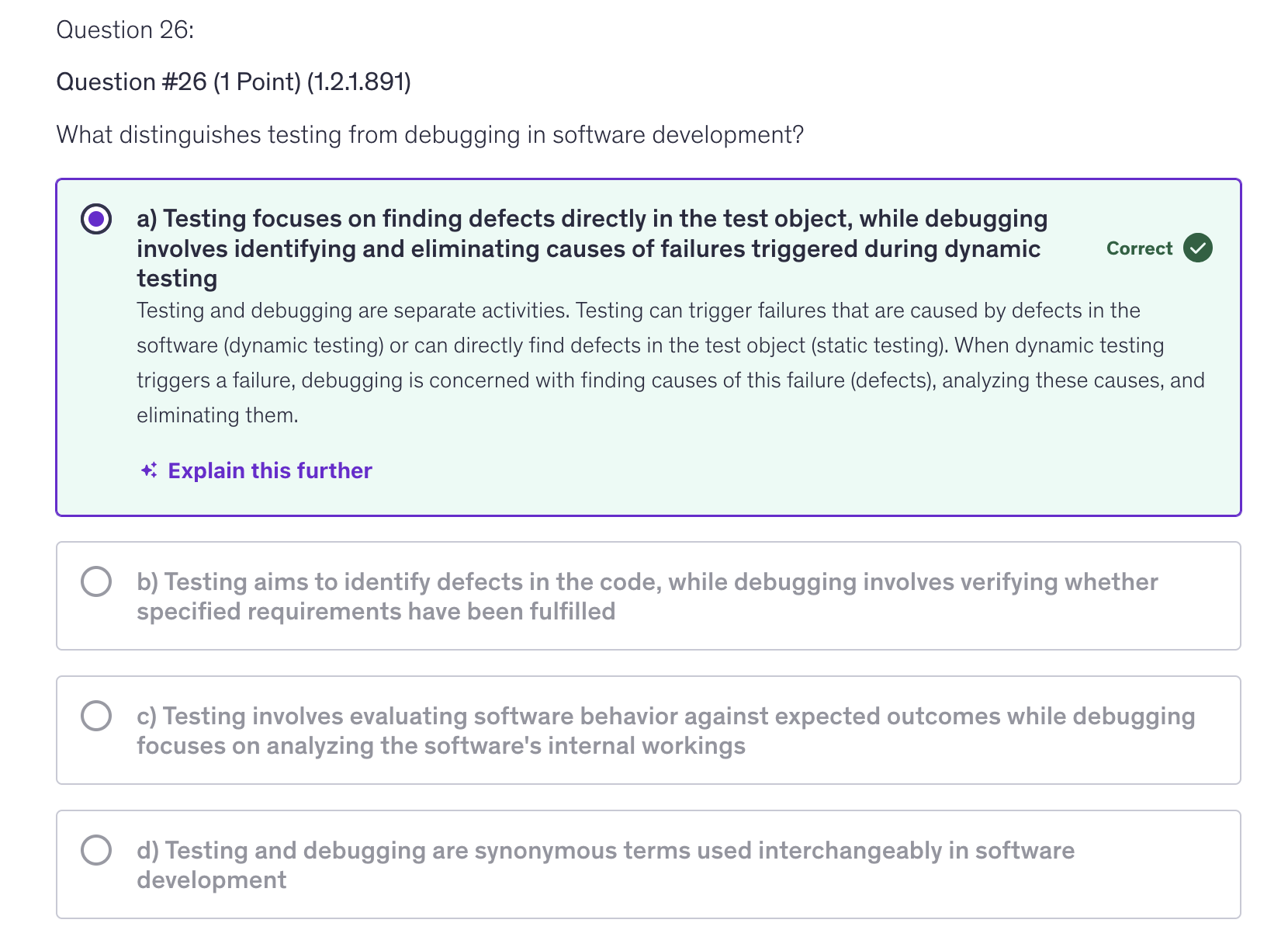1.1 What is Testing? Q's (1.1 Quizzes I, II, and III)
1/65
Earn XP
Description and Tags
Quizzes I, II, and III of 1.1 Fundamentals of Testing
Name | Mastery | Learn | Test | Matching | Spaced | Call with Kai |
|---|
No analytics yet
Send a link to your students to track their progress
66 Terms
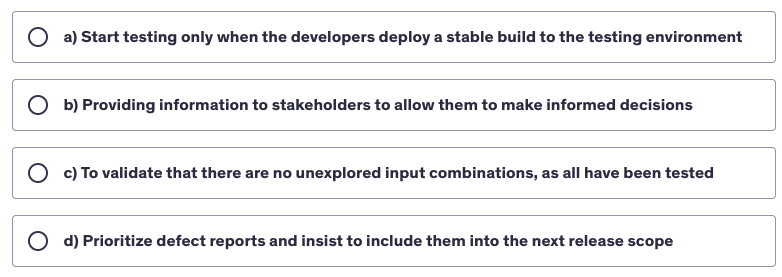
Which of the following is USUALLY stated as a testing objective?
b) providing information to stakeholders to allow them to make informed decisions
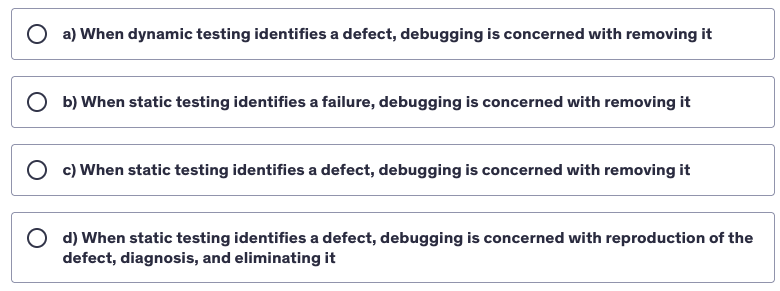
Which of the following statements BEST describes the difference between testing and debugging?
c) when static testing identifies a defect, debugging is concerned with removing it

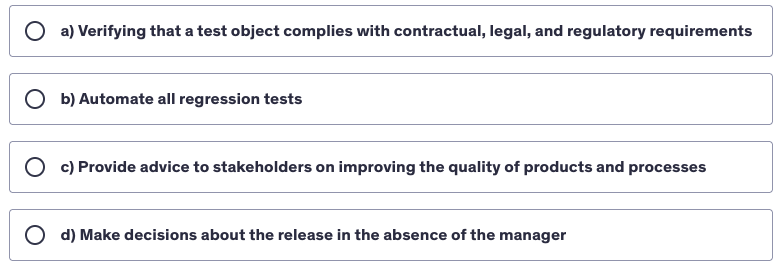
Which of the following statements describe a valid test objective?
a) verifying that a test object complies with contractual, legal, and regulatory requirements
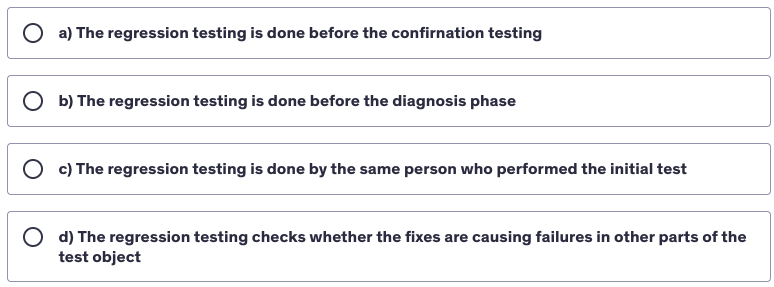
Which of the following statements BEST describes regression testing?
d) the regression testing checks whether the fixes are causing failures in other parts of the test object
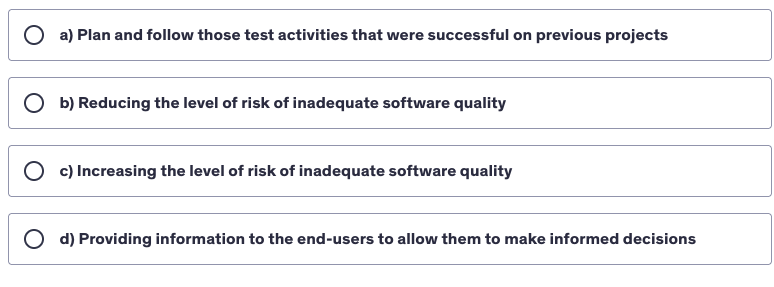
Which of the following statements describe a typical test objective?
b) reducing the risk of inadequate software quality
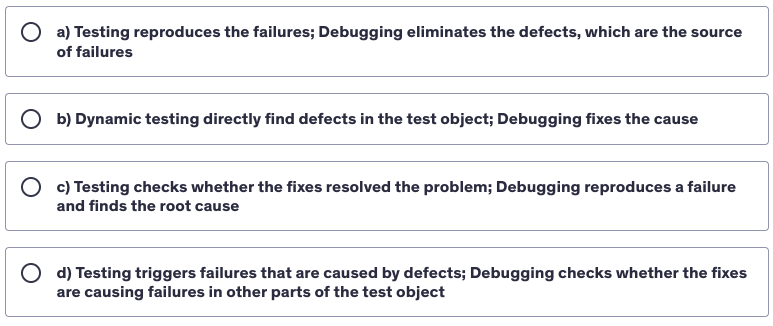
Which of the following statements correctly describes the difference between testing and debugging?
c) testing checks whether the fixes resolved the problem; debugging reproduces a failure and finds the root cause

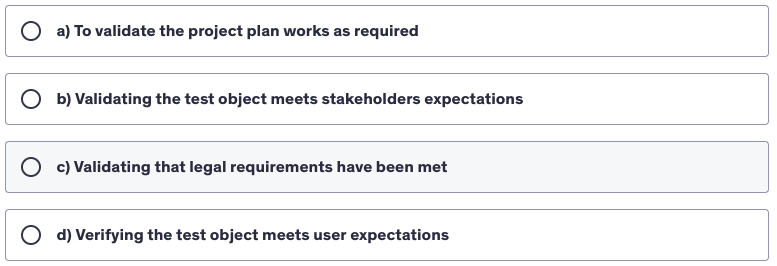
Which of the following is a typical test objective?
b) validating the test object meets stakeholders expectations
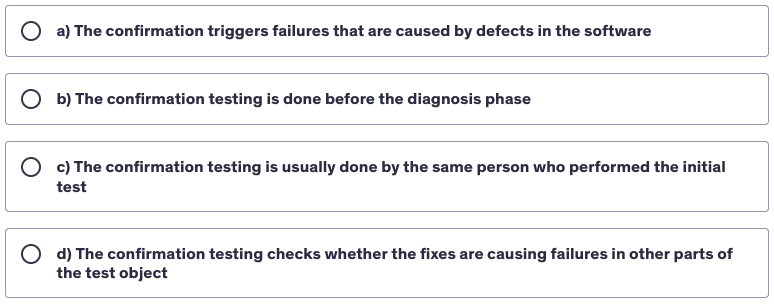
Which of the following statements BEST describes confirmation testing?
c) the confirmation testing is usually done by the same person who performed the initial test
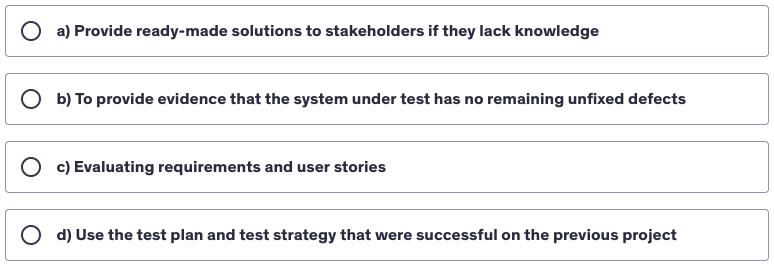
Which of the following statements describe a valid test objective?
c) evaluating requirements and user stories
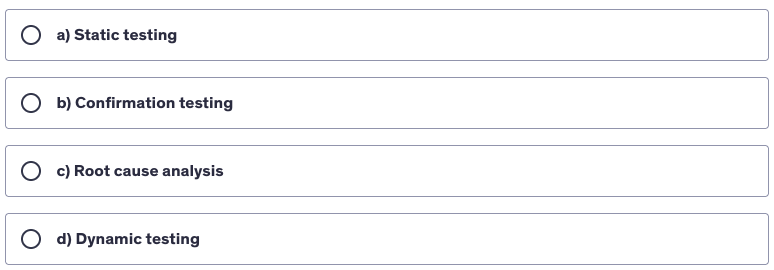
A failure was encountered during dynamic testing, and your task involves identifying the root cause of the failure. What activity are you performing?
c) root cause analysis

Which of the following statements describe a valid test objective?
c) triggering failures and identifying defects
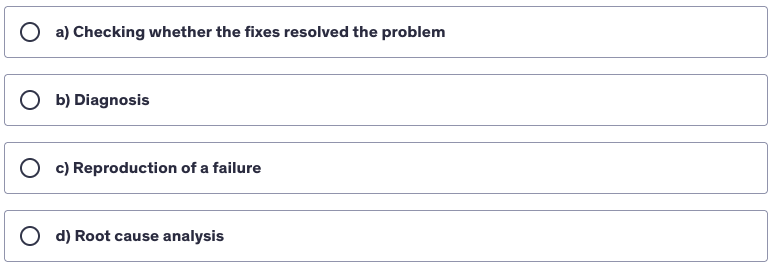
Which is NOT a debugging activity:
a) checking whether the fixes resolved the problem
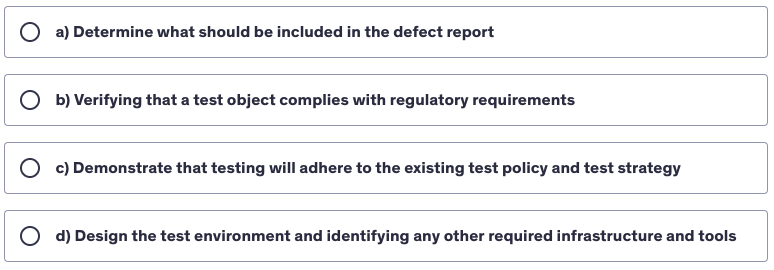
Which of the following statements describes a typical test objective?
b) Verifying that a test object complies with regulatory requirements
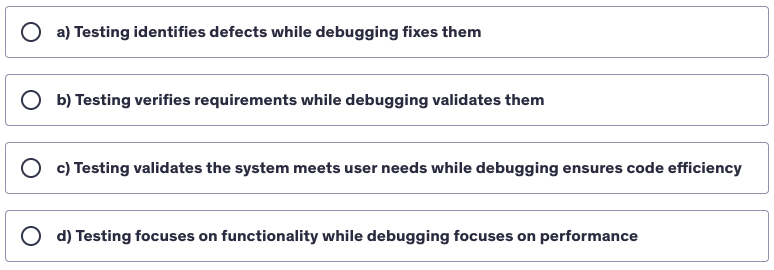
Which of the following statements accurately describes the primary difference between testing and debugging?
a) testing identifies defects while debugging fixes them
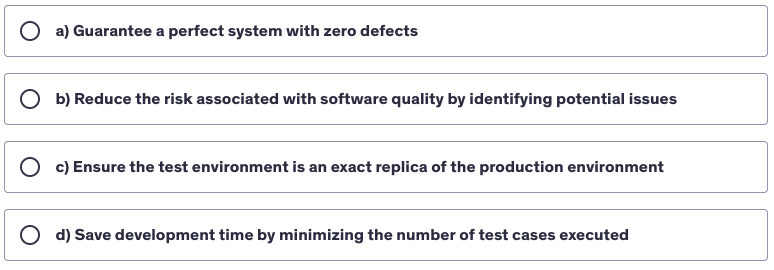
One of the main goals of test objectives is to:
b) Reduce the risk associated with software quality by identifying potential issues
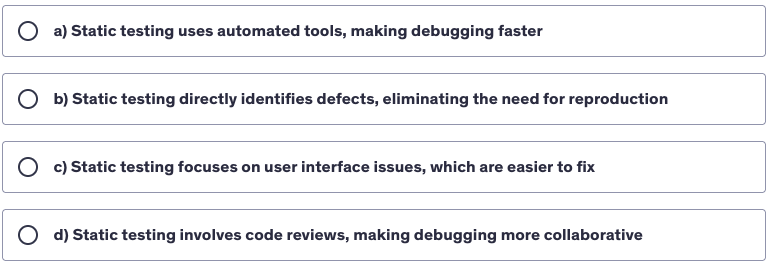
When static testing identifies a defect, why is the debugging process simpler compared to dynamic testing?
b) static testing directly identifies defects, eliminating the need for reproduction

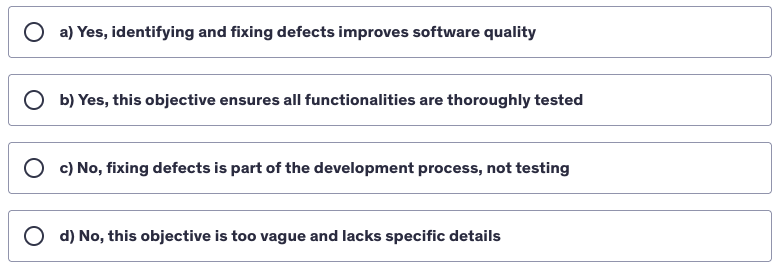
A testing team defines the following objective: "To identify and fix defects in the new accounting software." Is this a valid test objective?
c) no, fixing defects is part of the development process, not testing

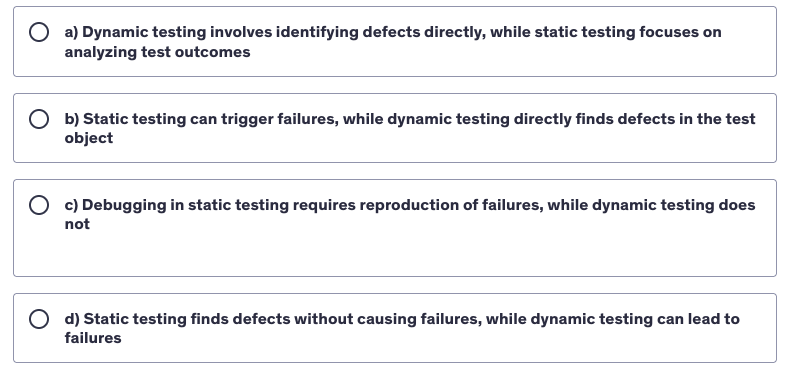
What is the main difference between debugging triggered by dynamic testing and static testing?
d) static testing finds defects without causing failures, while dynamic testing can lead to failures

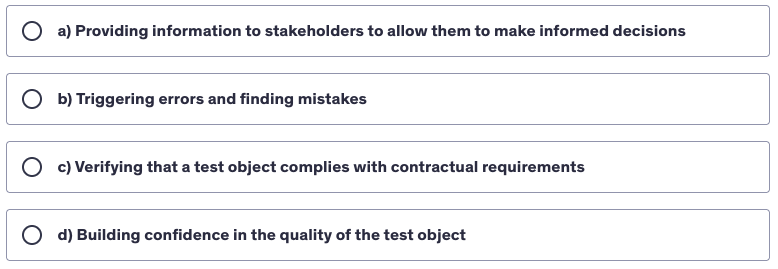
What is not typically considered as a test objective?
b) triggering errors and finding mistakes

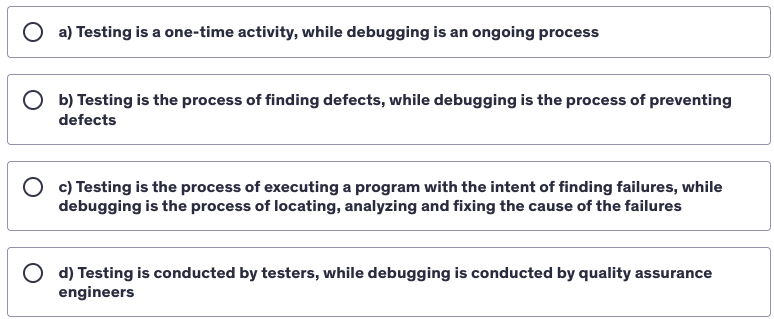
Which choice most correctly outlines the key difference between testing and debugging?
c) Testing is the process of executing a program with the intent of finding failures, while debugging is the process of locating, analyzing and fixing the cause of the failures
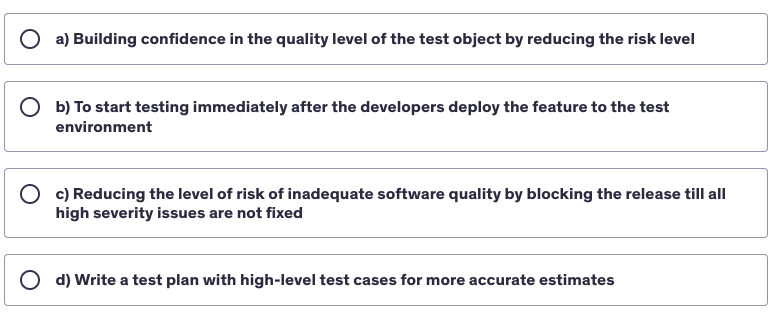
Which of the following statements is a valid objective for testing?
a) Building confidence in the quality level of the test object by reducing the risk level
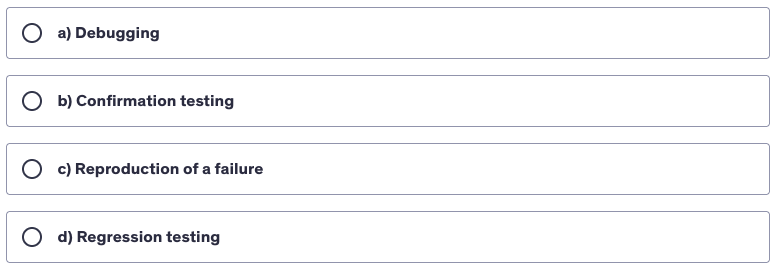
After fixing a defect that was identified through dynamic testing, what activity should ideally follow to ensure the problem is resolved?
b) confirmation testing
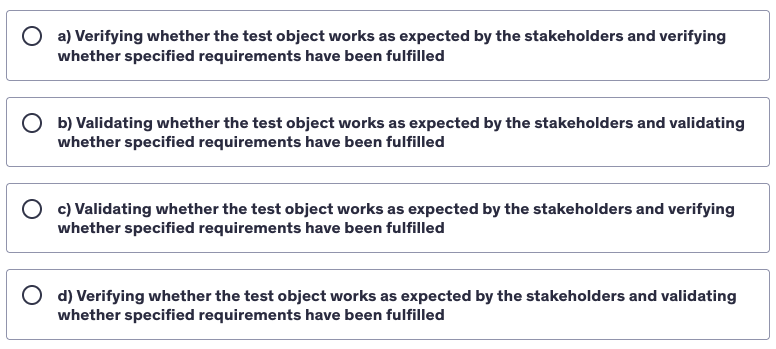
Which of the following statements describe a valid test objective?
c) validating whether the test object works as expected by the stakeholders and verifying whether specified requirements have been fulfilled
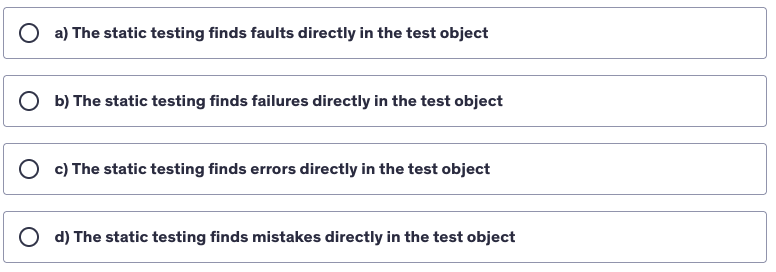
Which of the following is true about the static testing?
a) the static testing finds faults directly in the test object
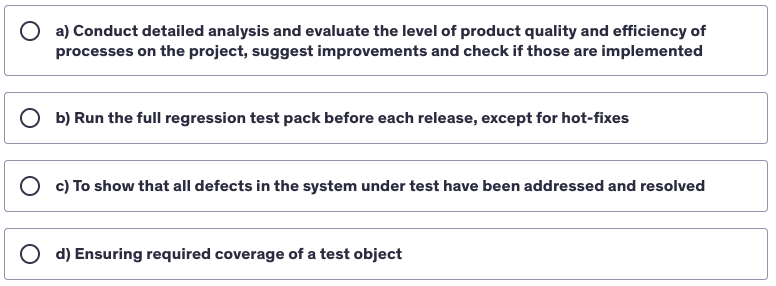
Which of the following is a typical objective of testing?
d) ensuring required coverage of a test object
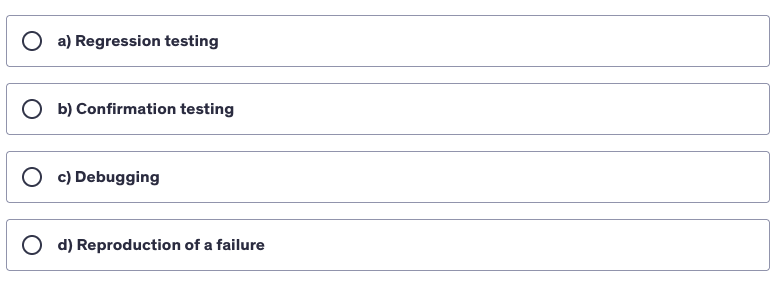
A failure was encountered during dynamic testing. The developer found the cause of the failure and fixed the defect. Your task involves checking whether the fix caused failures in other parts of the system.
What activity are you performing?
a) regression testing
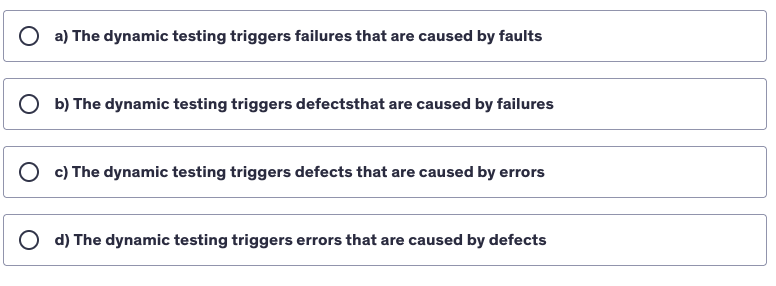
Which of the following is true about dynamic testing?
a) dynamic testing triggers failures that are caused by faults
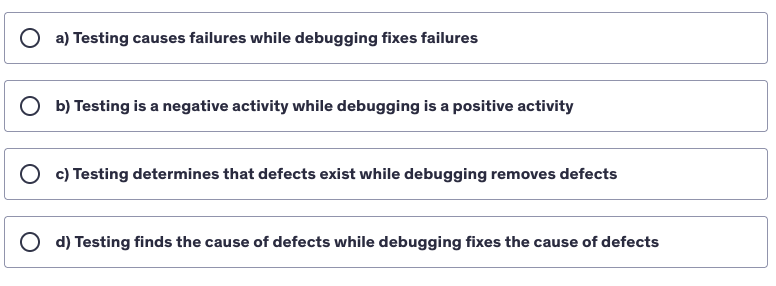
Which of the following statements BEST describes the difference between testing and debugging?
c) testing determines that defects exist while debugging removes defects

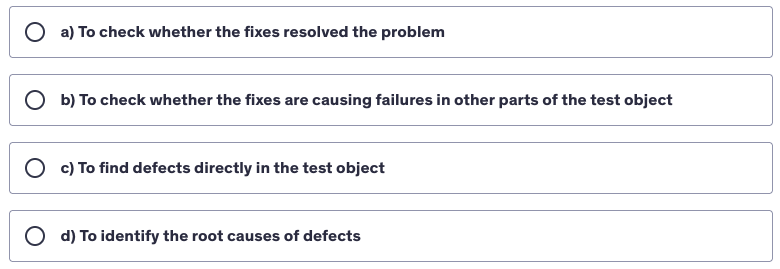
Which is NOT the testing activity:
d) to identify the root causes of defects
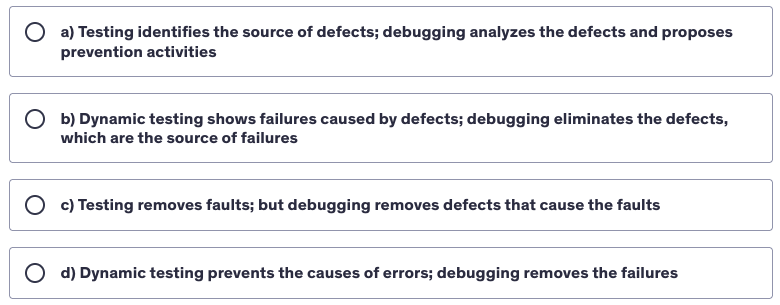
Which of the following statements correctly describes the difference between testing and debugging?
b) dynamic testing shows failures caused by defects; debugging eliminates the defects, which are the source of failures

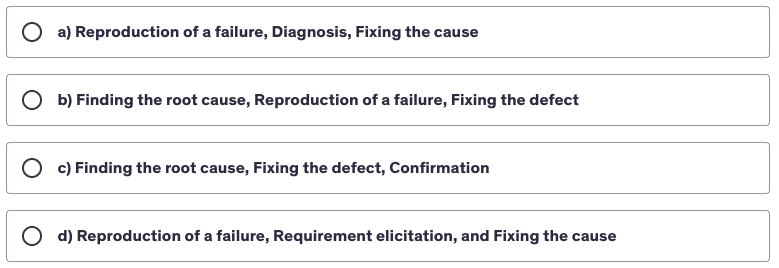
What is the sequence of activities in the typical debugging process when dynamic testing triggers a failure in the software?
a) reproduction of a failure, diagnosis, fixing the cause

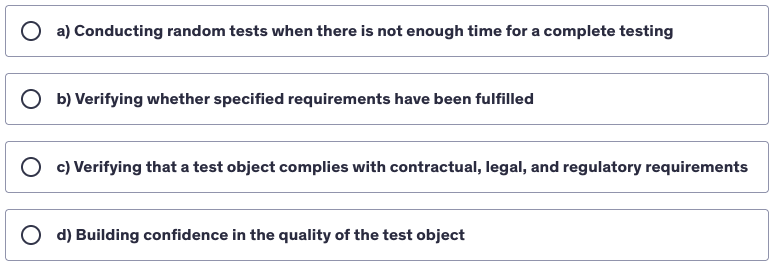
Which of the following is NOT a valid test objective?
a) conducting random tests when there is not enough time for complete testing

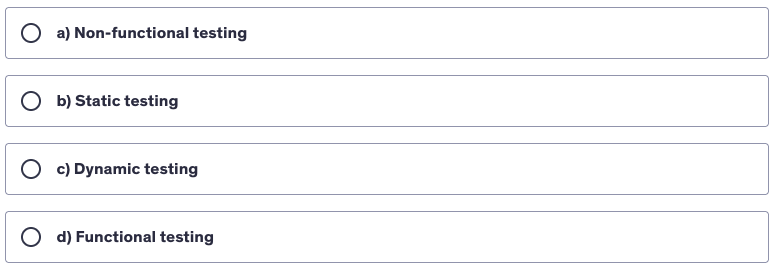
Which testing activity directly identifies defects without causing failures?
b) Static testing

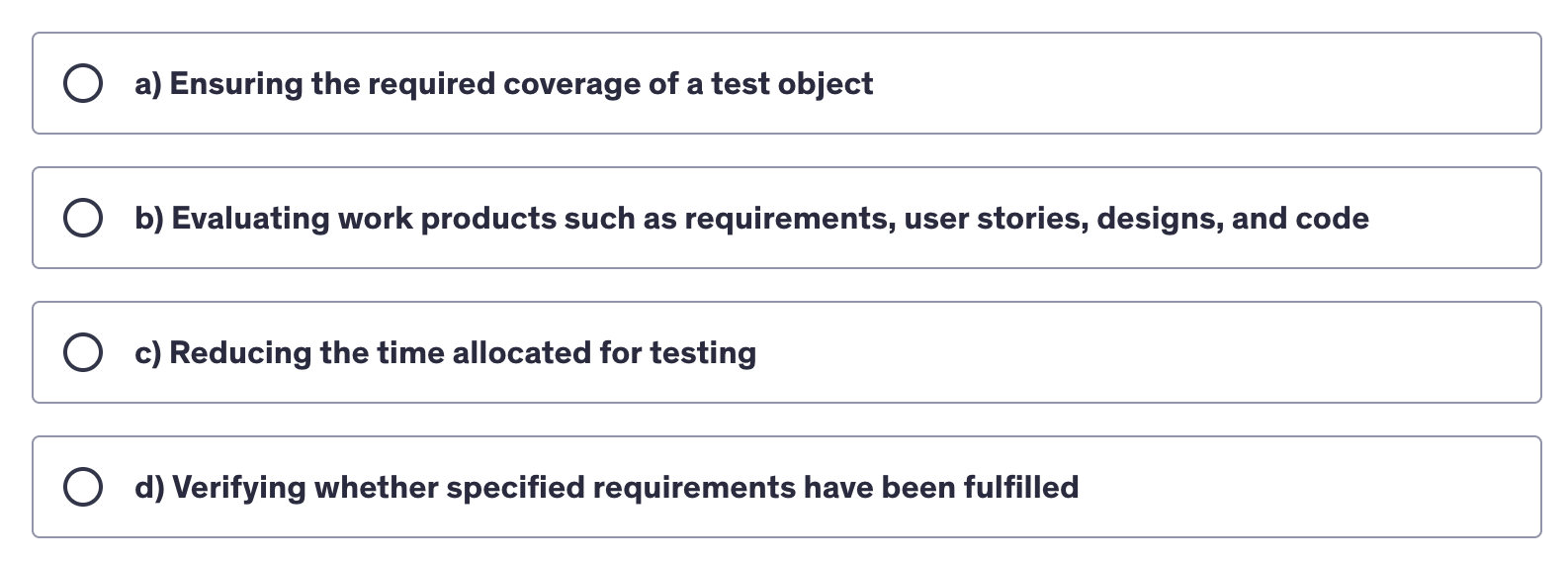
Which of the following is NOT a typical test objective?
c) reducing the time allocated for testing

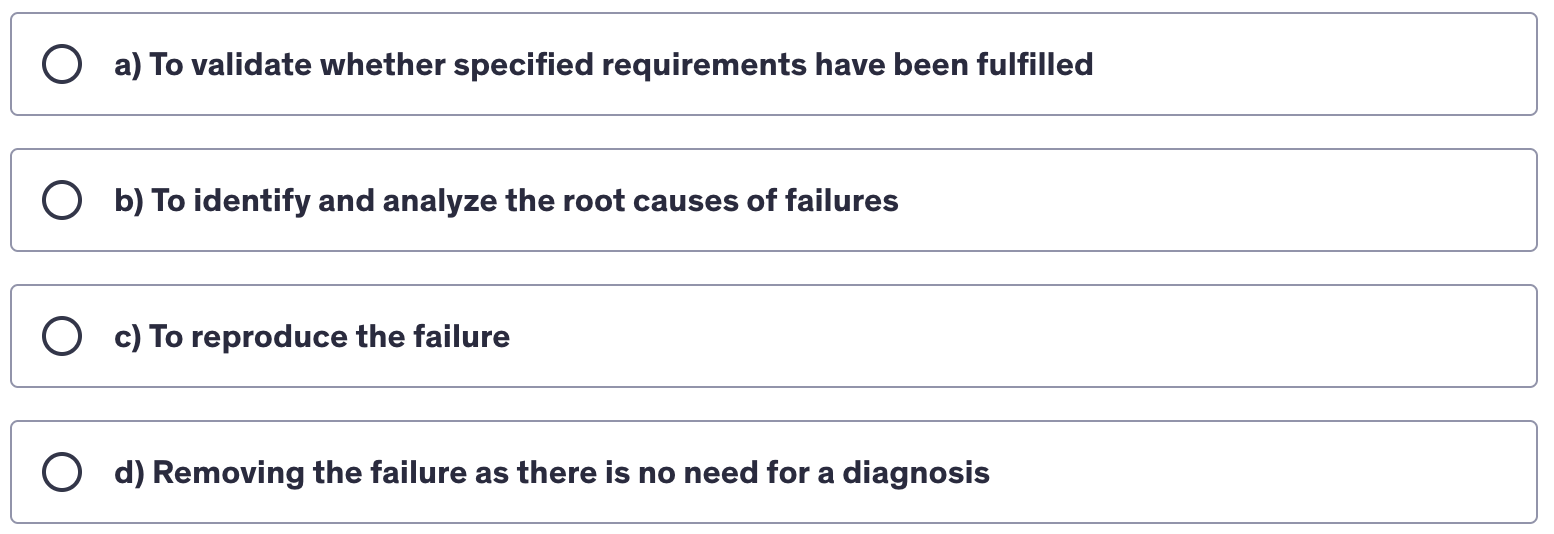
What is the first step of the debugging process when the failure is triggered by dynamic testing?
c) to reproduce the failure

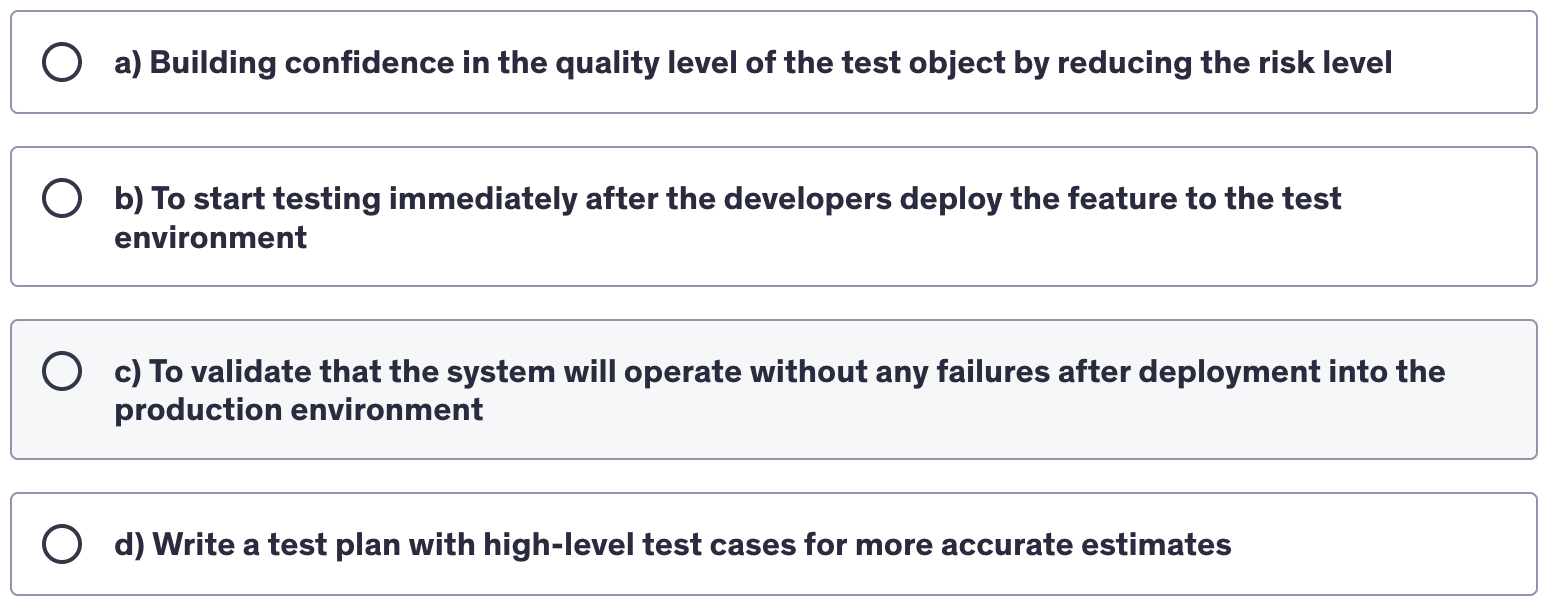
Which of the following statements is a valid objective for testing?
a) building confidence in the quality level of the test object by reducing the risk level
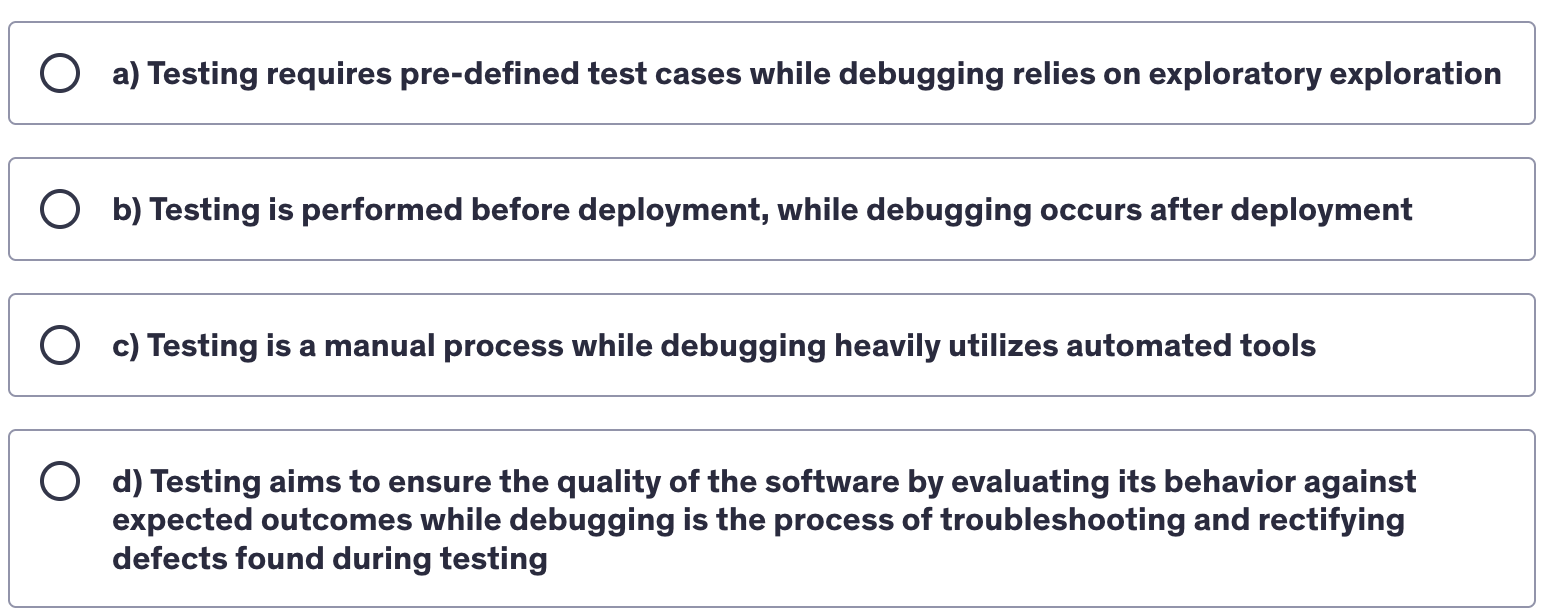
Which of the following statements accurately describes the primary difference between testing and debugging?
d) testing aims to ensure the quality of the software by evaluating its behavior against expected outcomes while debugging is the process of troubleshooting and rectifying defects found during testing
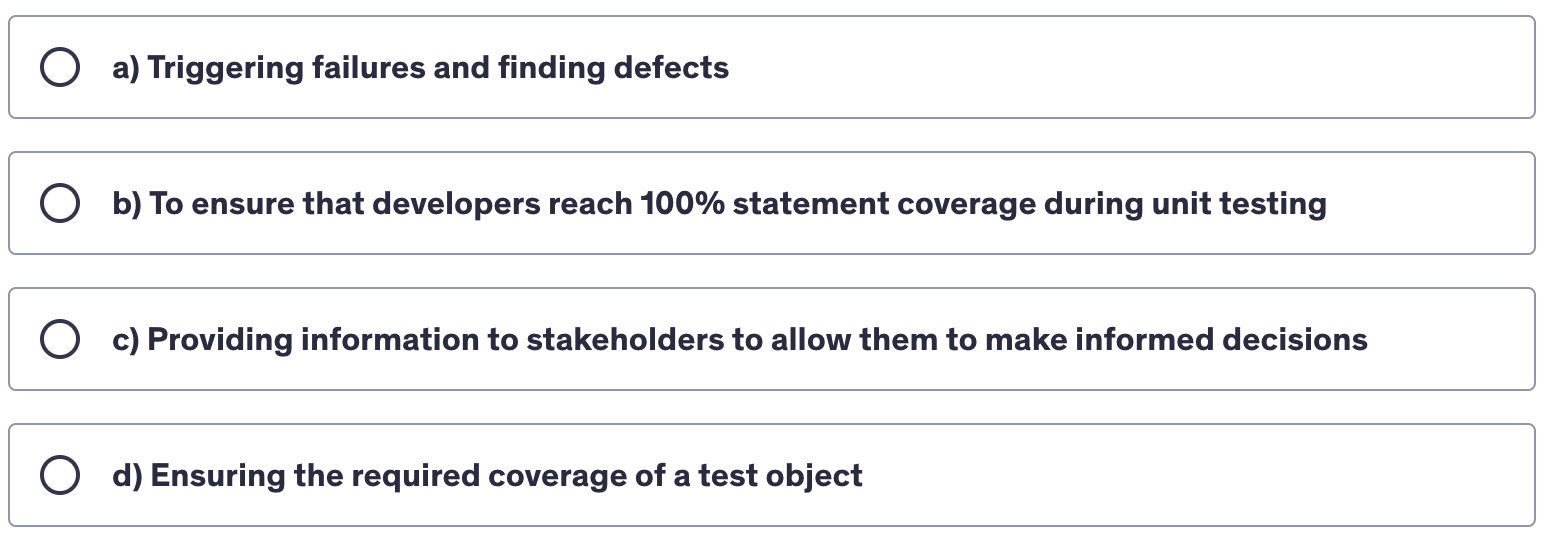
Identify the invalid test objective from the options:
b) to ensure that developers reach 100% statement coverage during unit testing

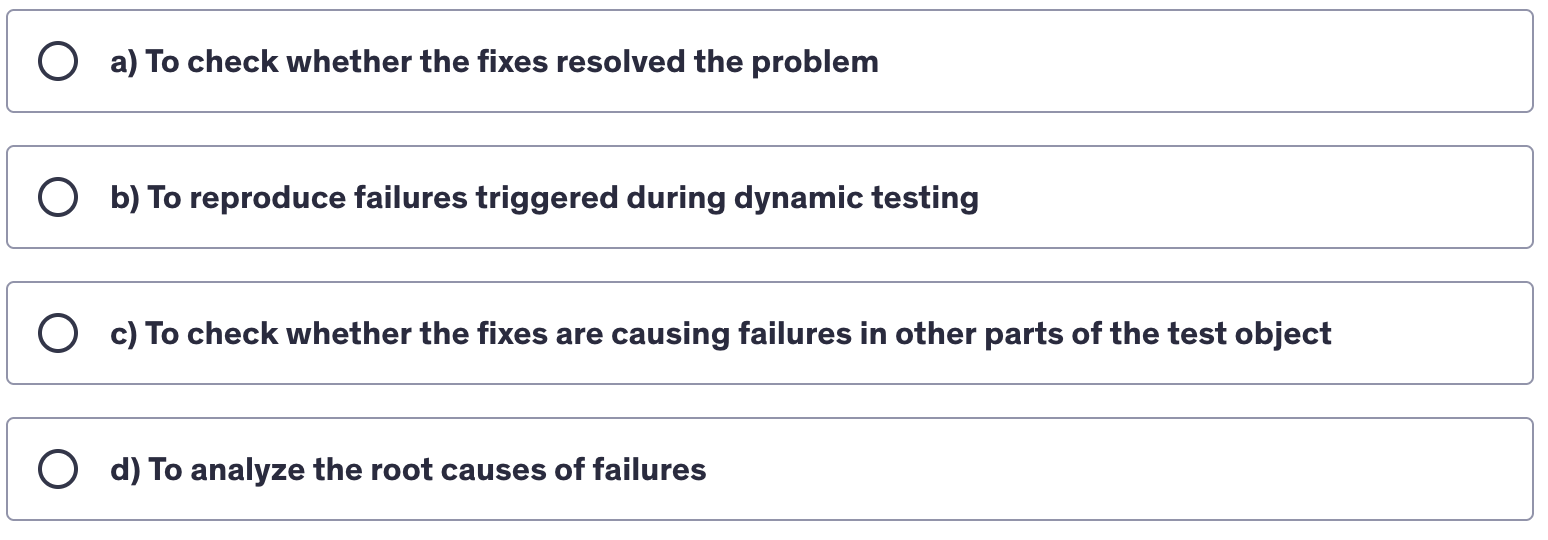
What is the purpose of regression testing in the debugging process?
c) to check whether the fixes are causing failures in other parts of the test object

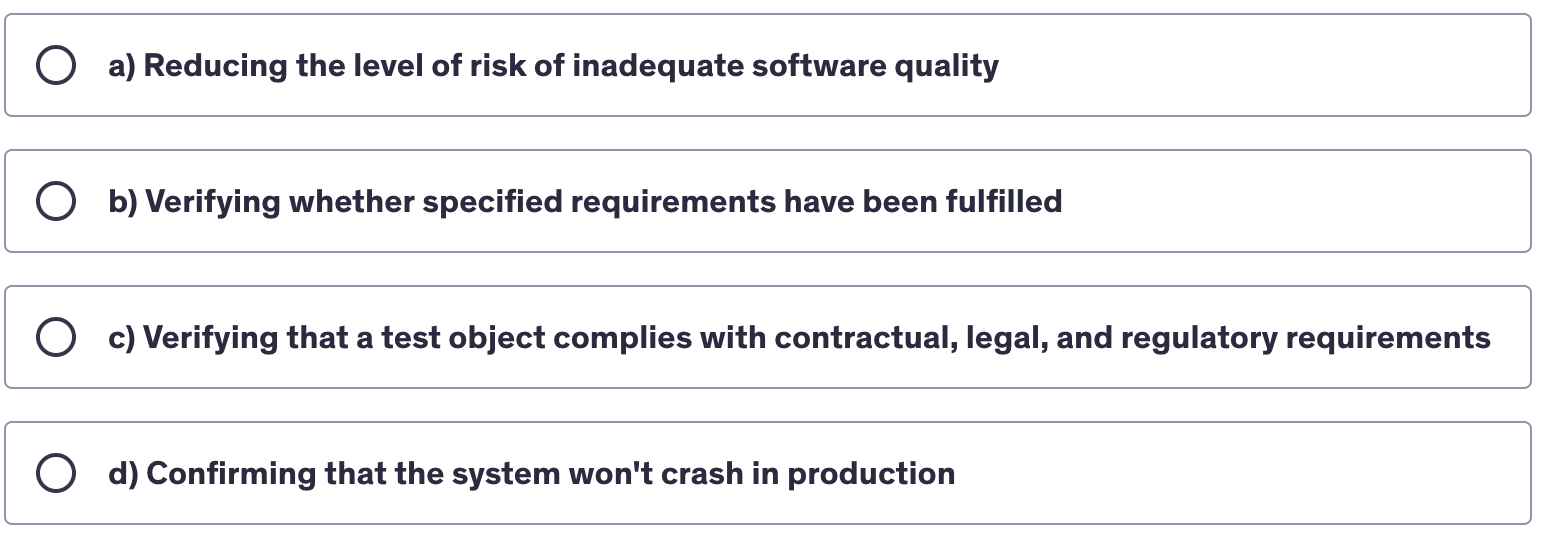
Which of the following is not a valid test objective?
d) confirming that the system won’t crash in production

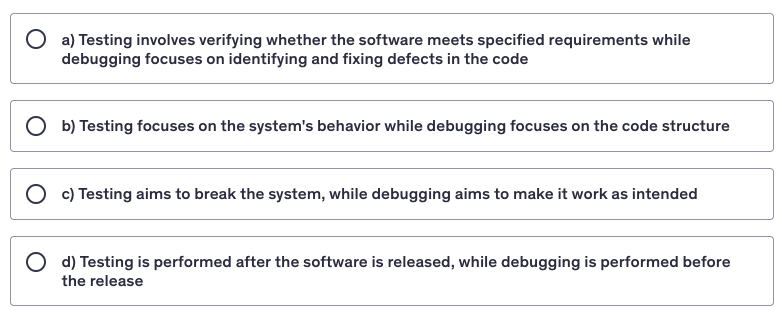
Which of the following statements accurately describes the primary difference between testing and debugging?
a) Testing involves verifying whether the software meets specified requirements while debugging focuses on identifying and fixing defects in the code

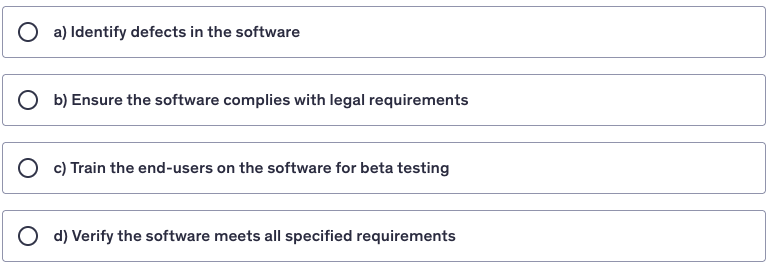
Which of the following is NOT a typical objective of testing?
c) Train the end-users on the software for beta testing

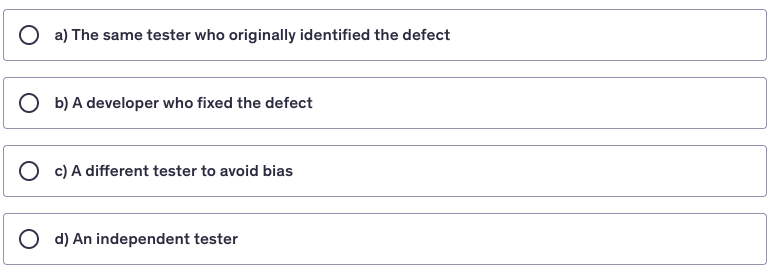
Who is preferably responsible for confirmation testing after debugging?
a) The same tester who originally identified the defect

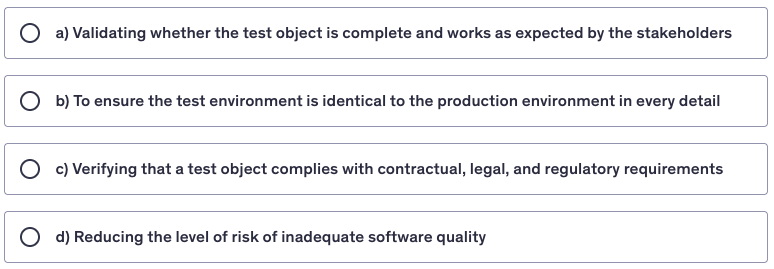
Which of the following is NOT a valid test objective?
b) To ensure the test environment is identical to the production environment in every detail


Which of the following is NOT a role of a tester in the debugging process?
c) Fixing defects
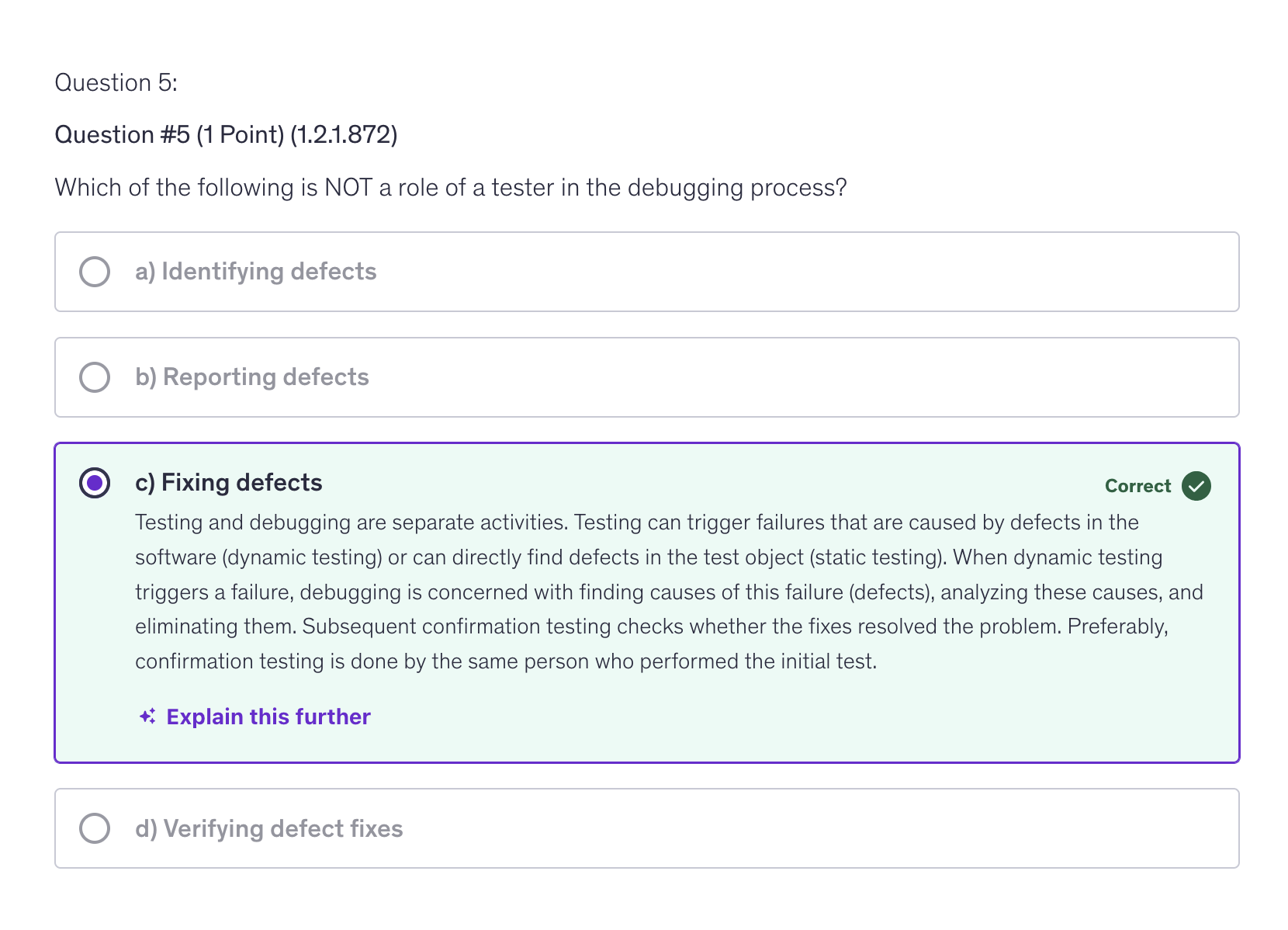

Which statement accurately describes the significance of test objectives in the software development process?
d) Test objectives help prioritize testing activities to meet project goals
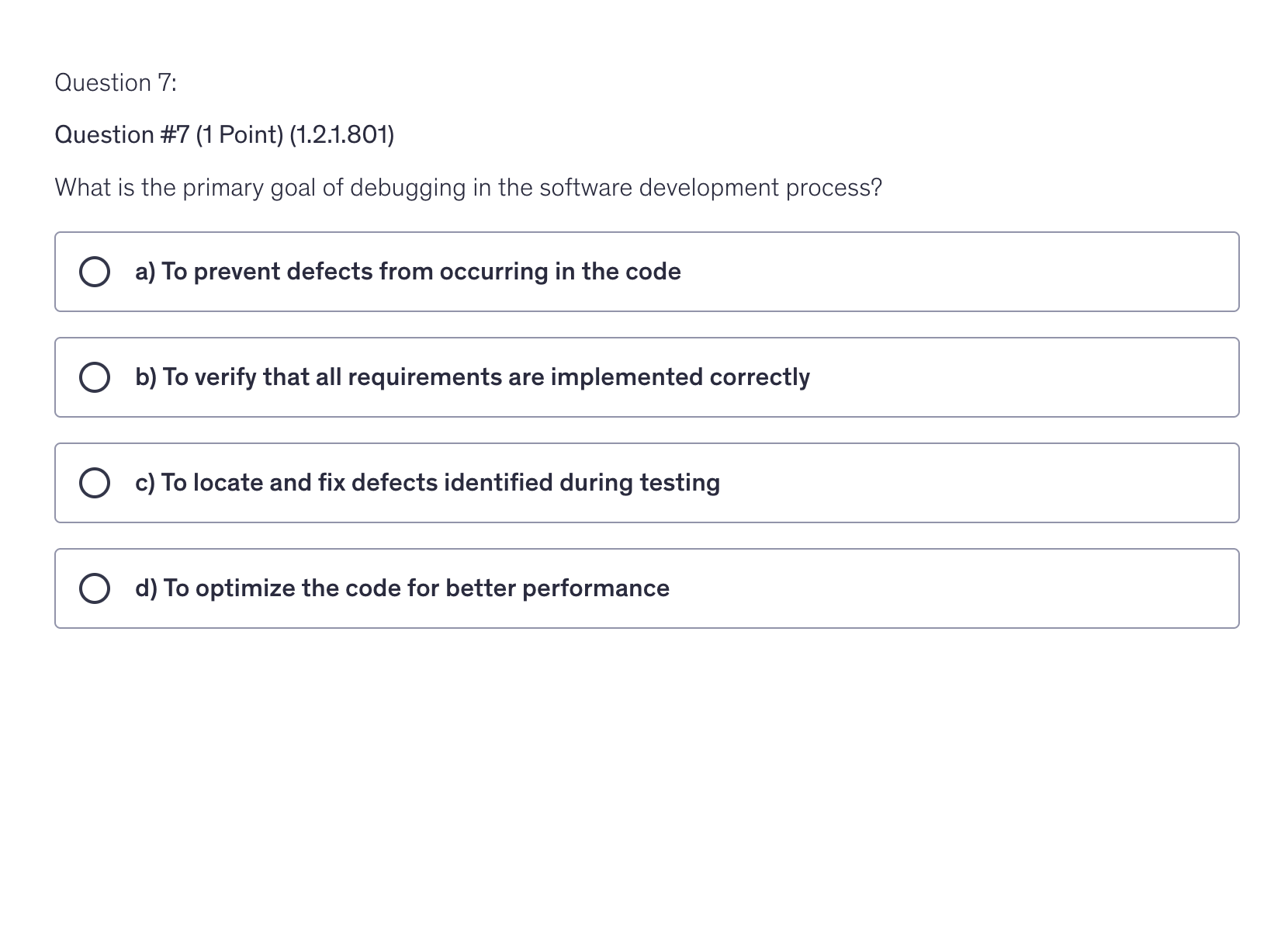
What is the primary goal of debugging in the software development process?
c) To locate and fix defects identified during testing
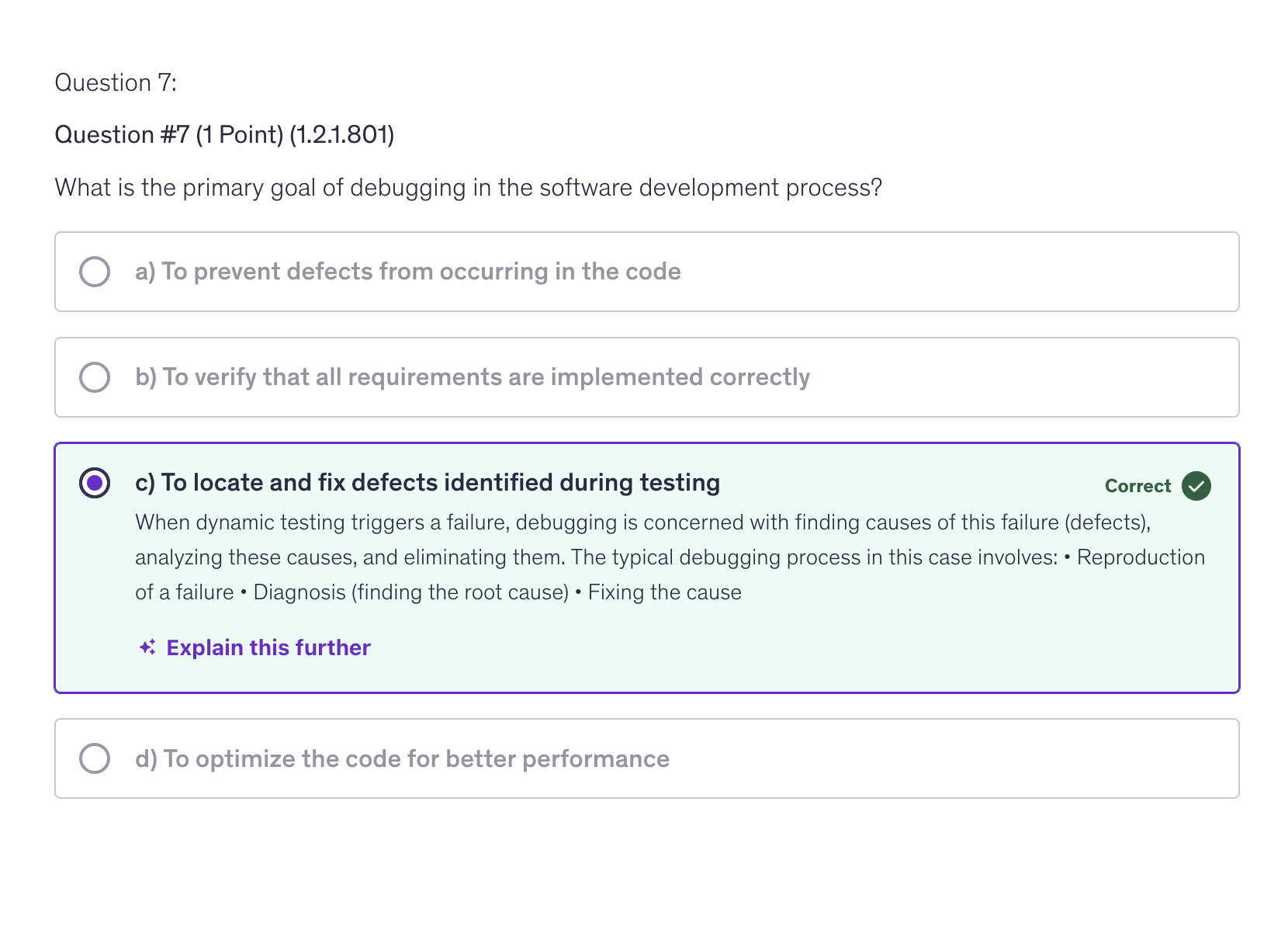
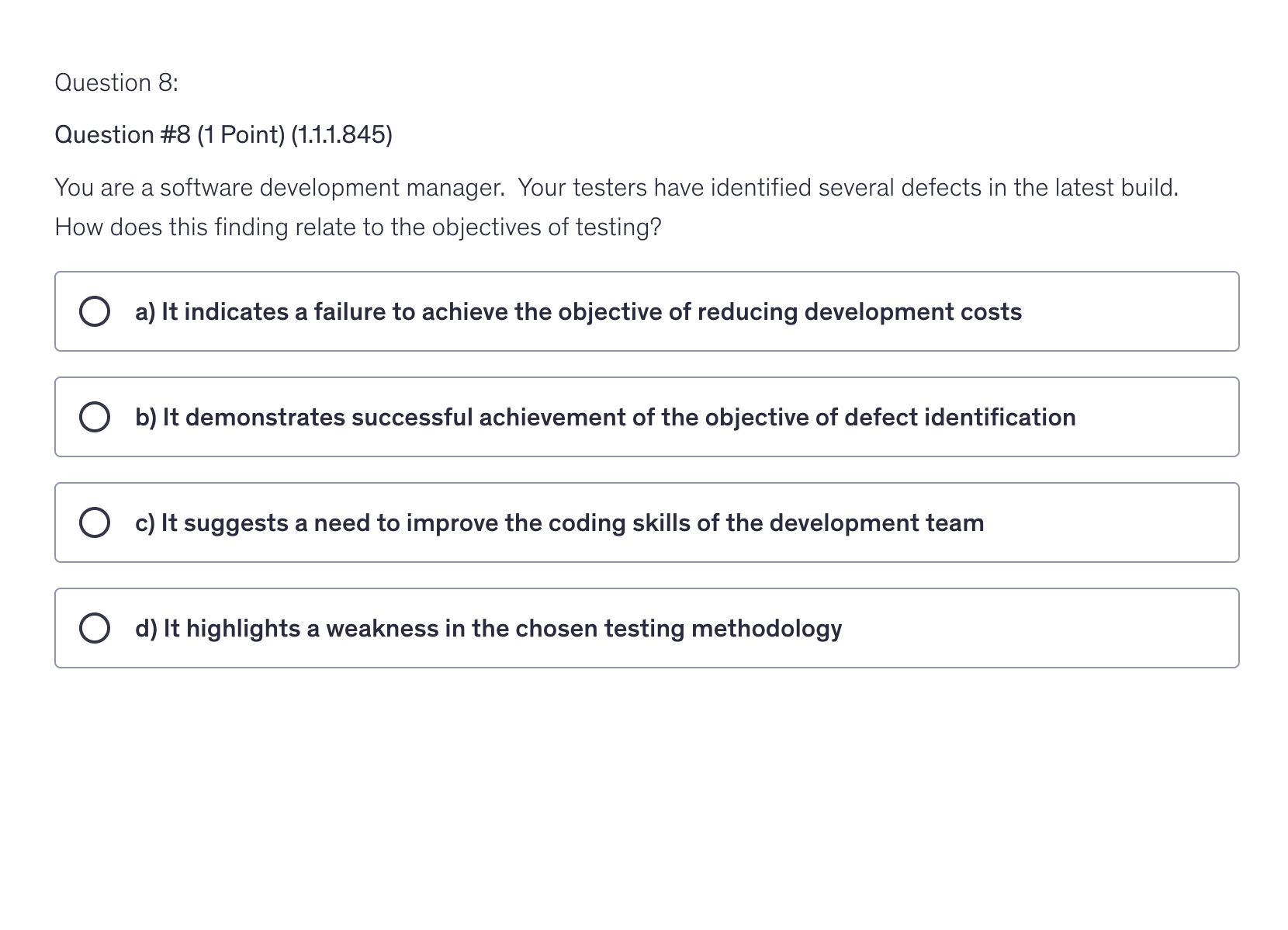
You are a software development manager. Your testers have identified several defects in the latest build. How does this finding relate to the objectives of testing?
b) It demonstrates successful achievement of the objective of defect identification

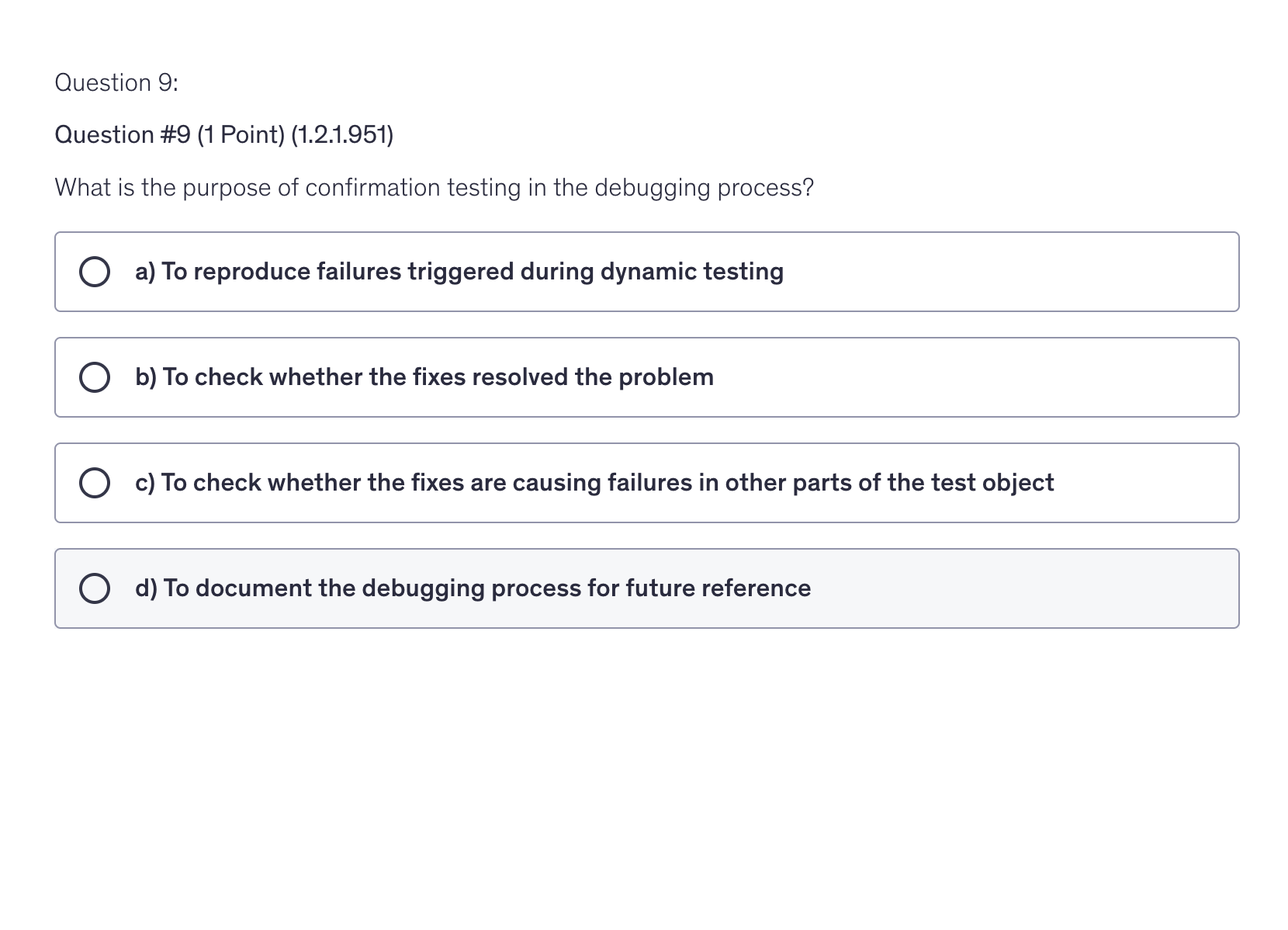
What is the purpose of confirmation testing in the debugging process?
b) To check whether the fixes resolved the problem
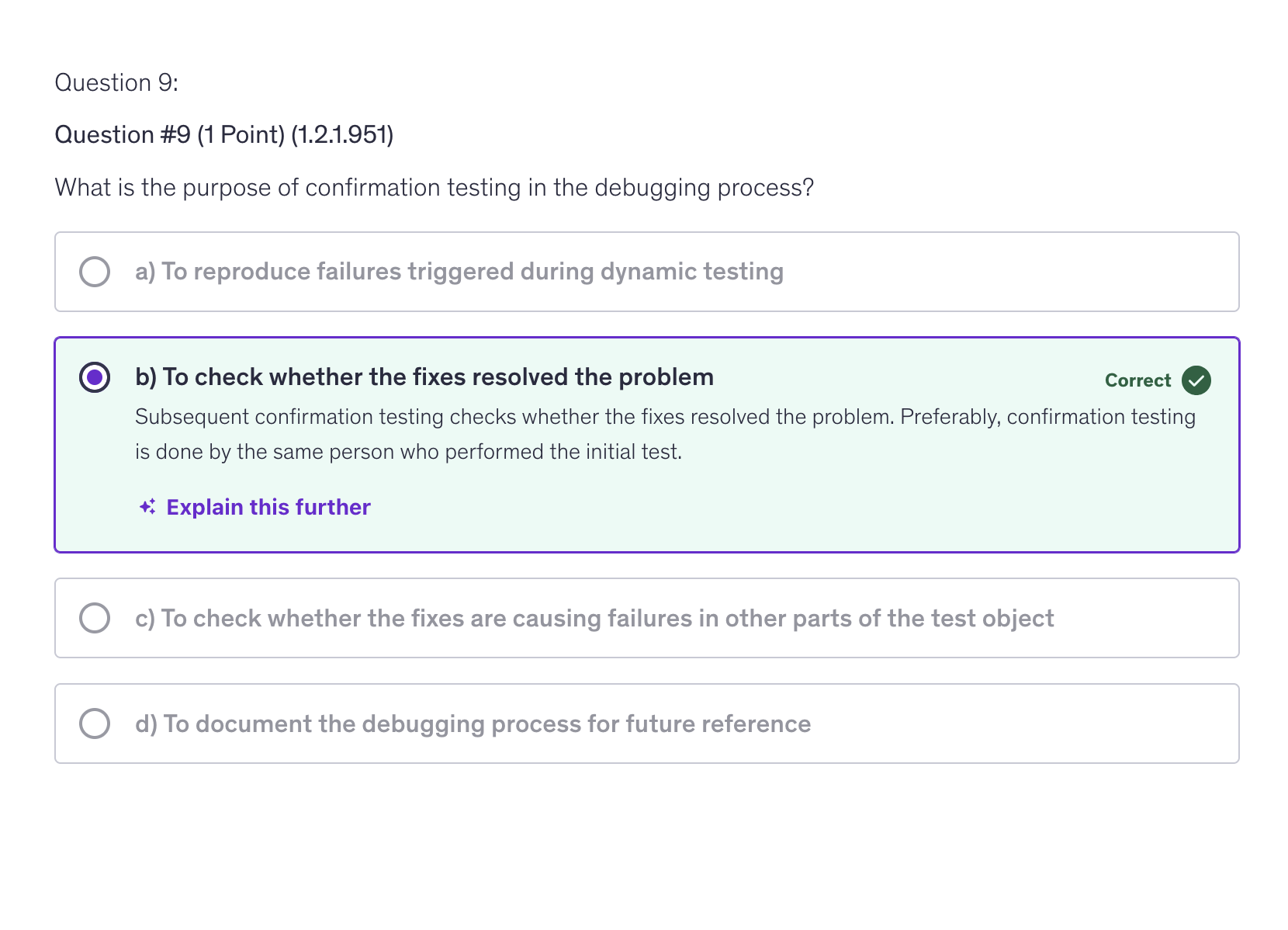
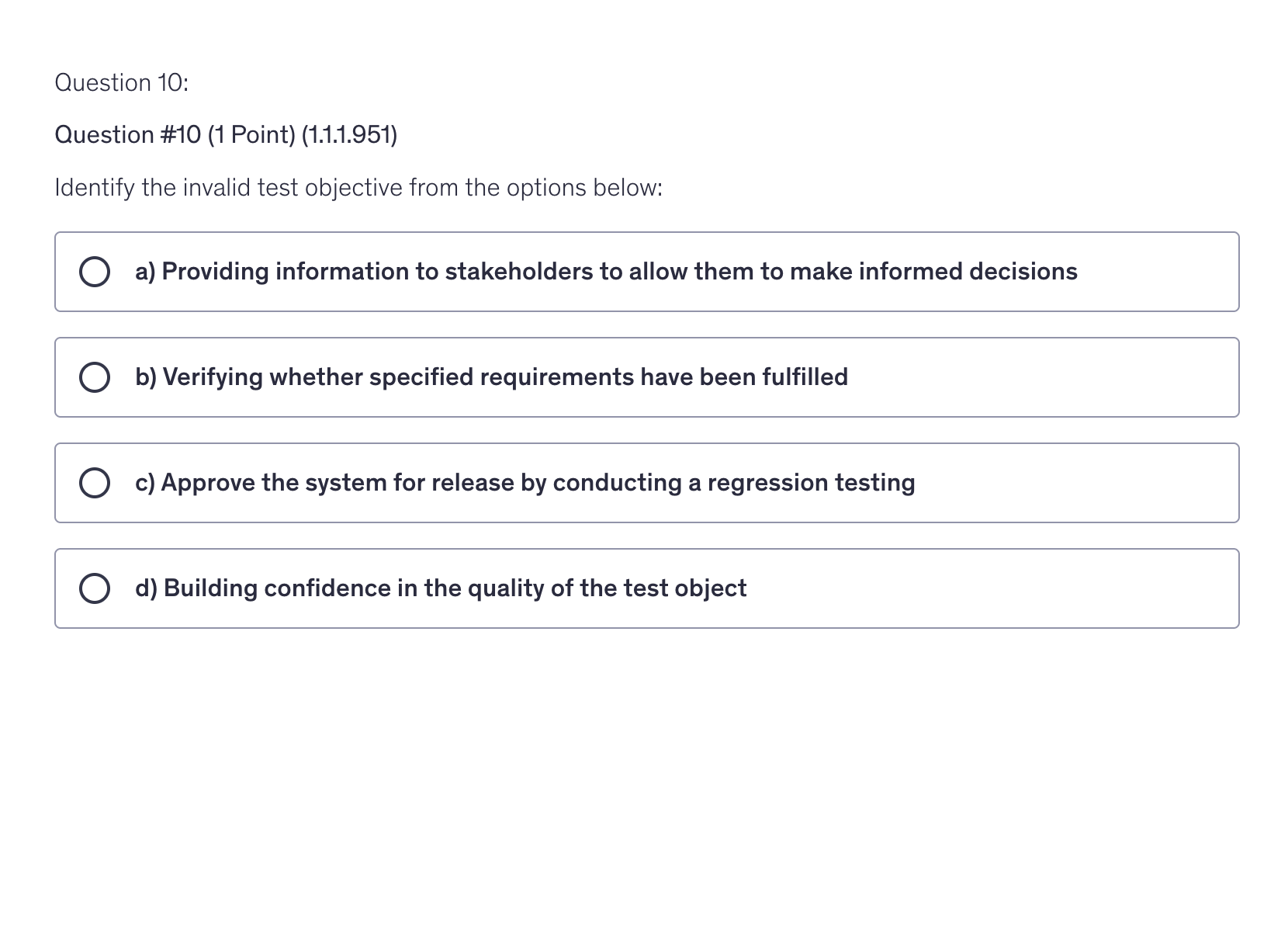
Identify the invalid test objective from the options below:
c) Approve the system for release by conducting a regression testing
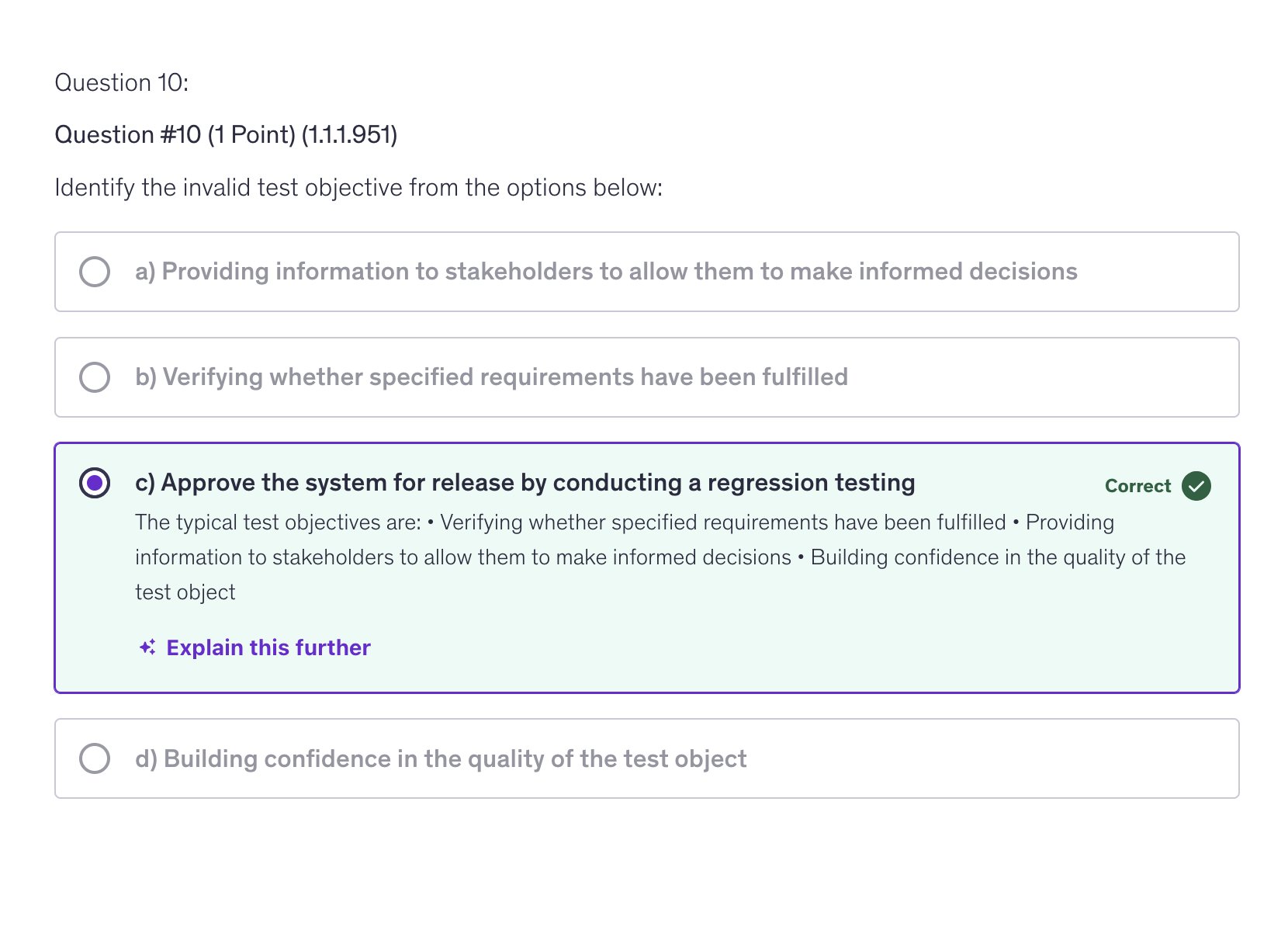
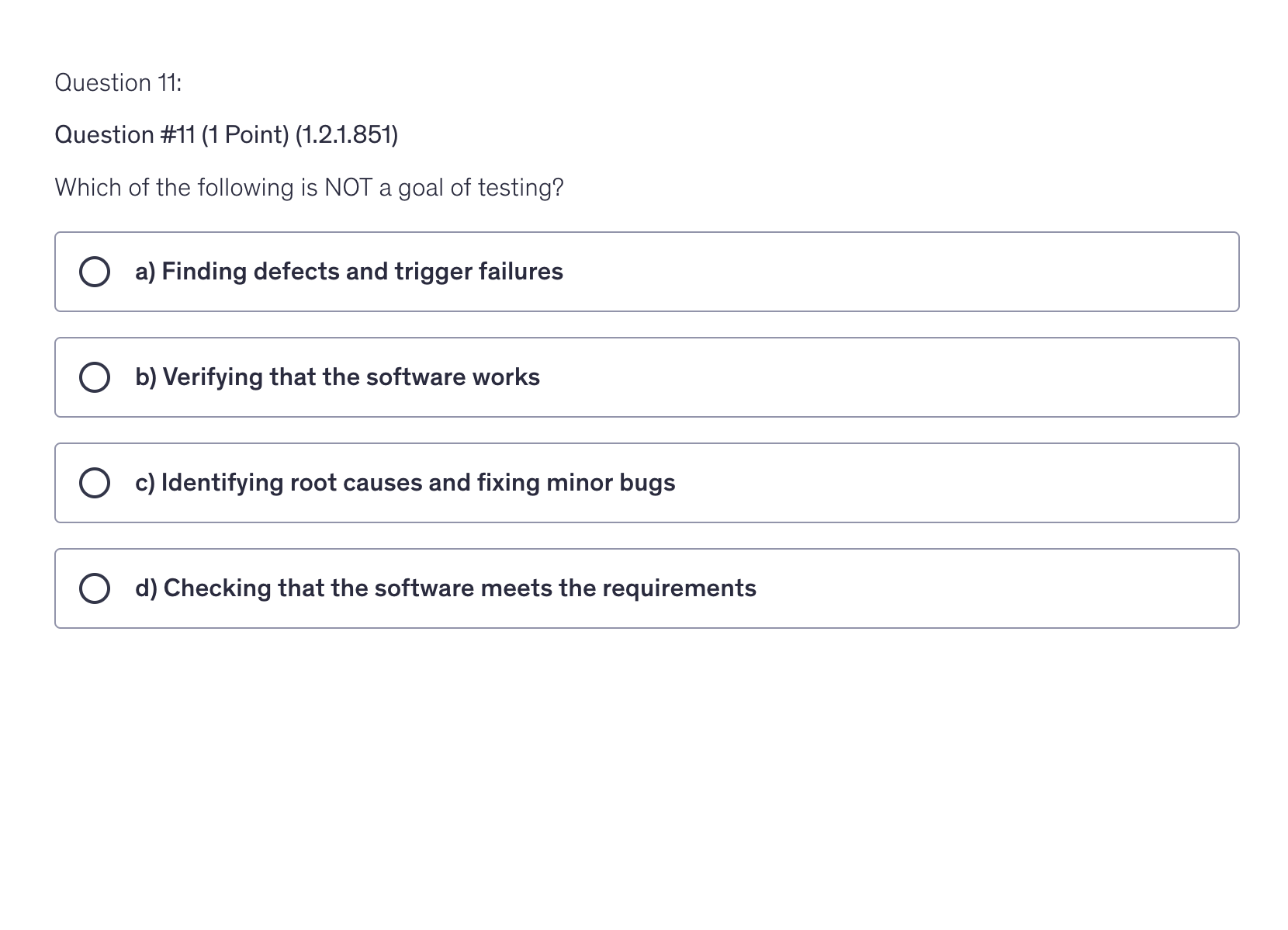
Which of the following is NOT a goal of testing?
c) Identifying root causes and fixing minor bugs
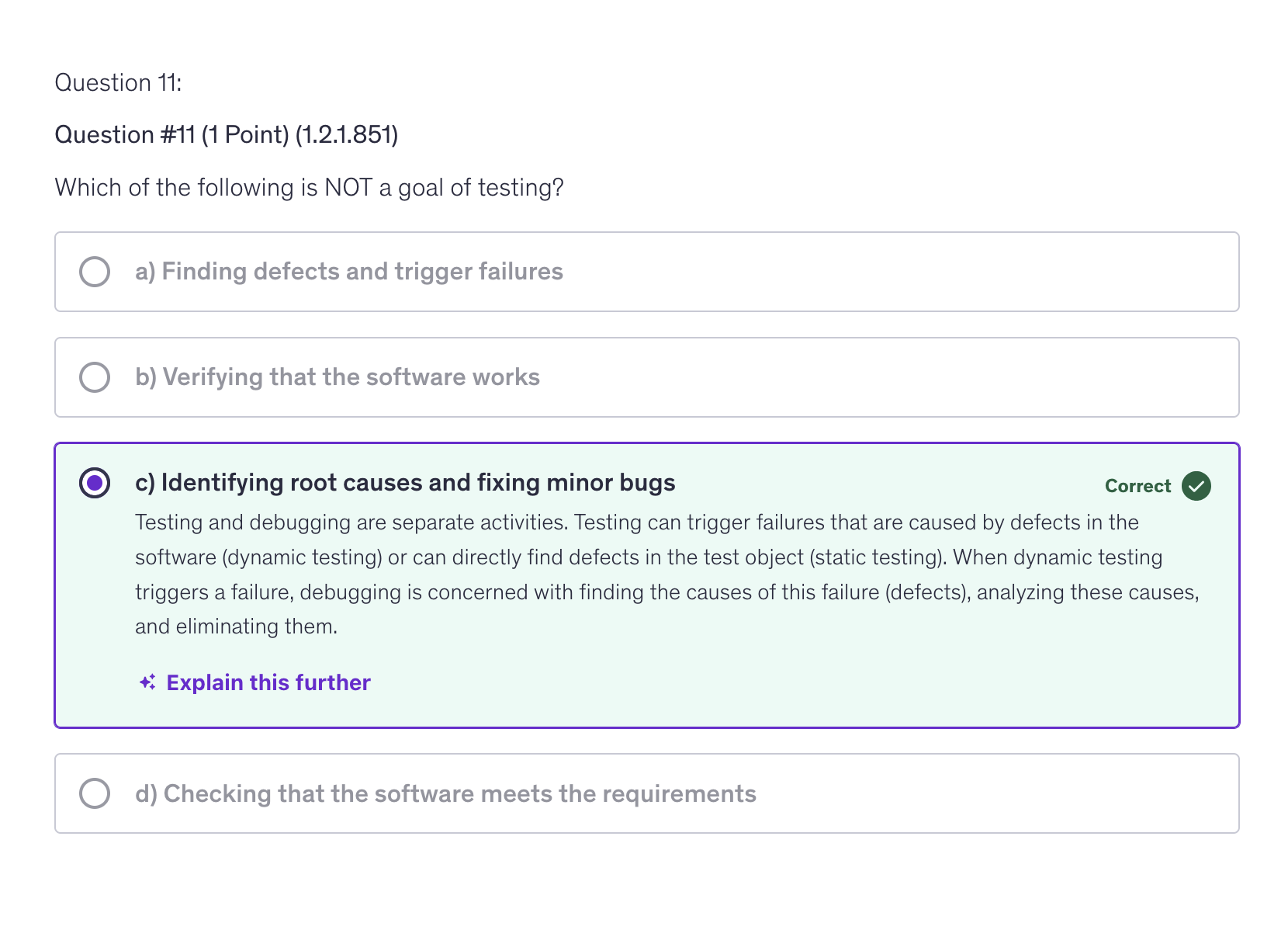
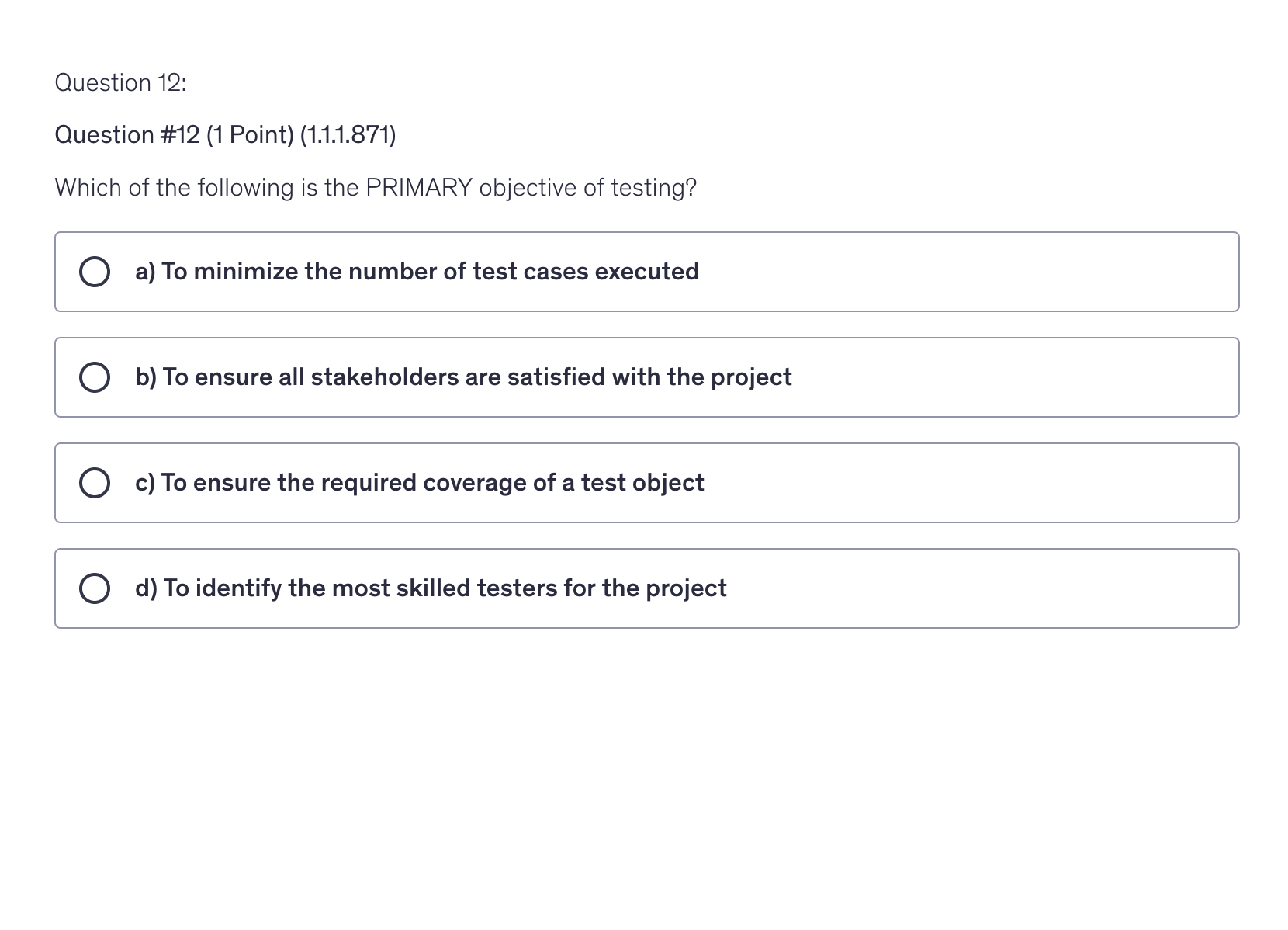
Which of the following is the PRIMARY objective of testing?
c) To ensure the required coverage of a test object
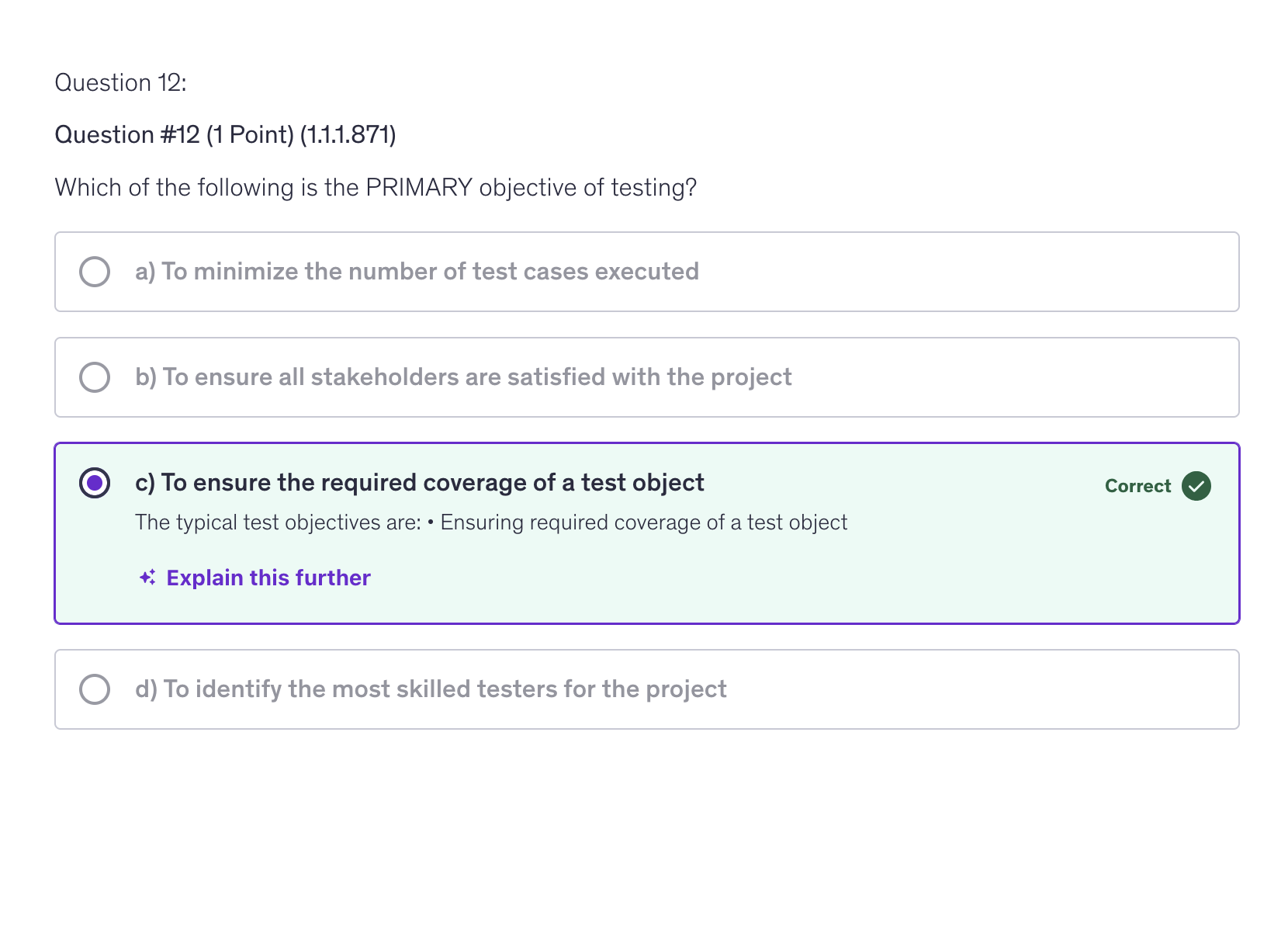
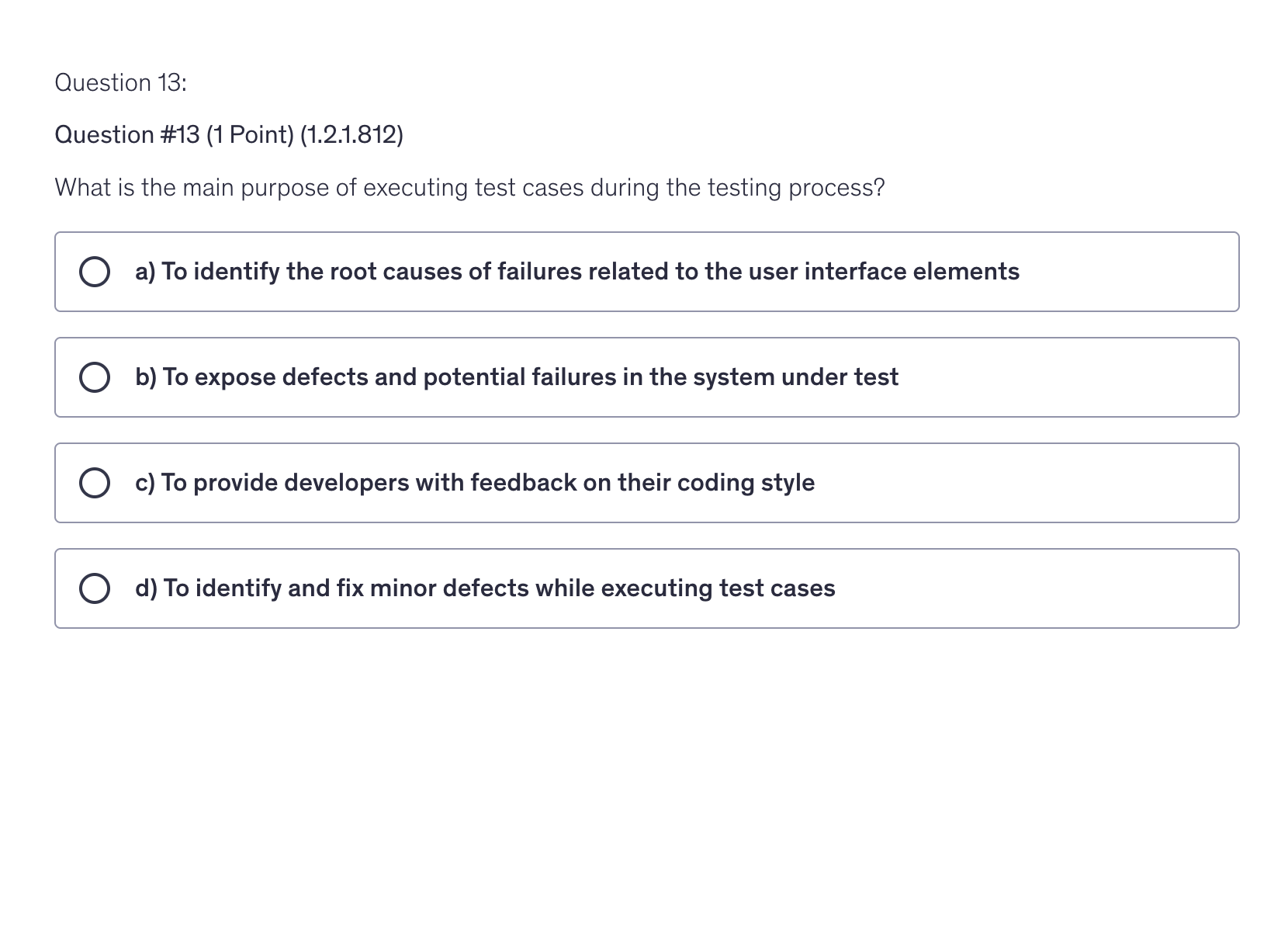
What is the main purpose of executing test cases during the testing process?
b) To expose defects and potential failures in the system
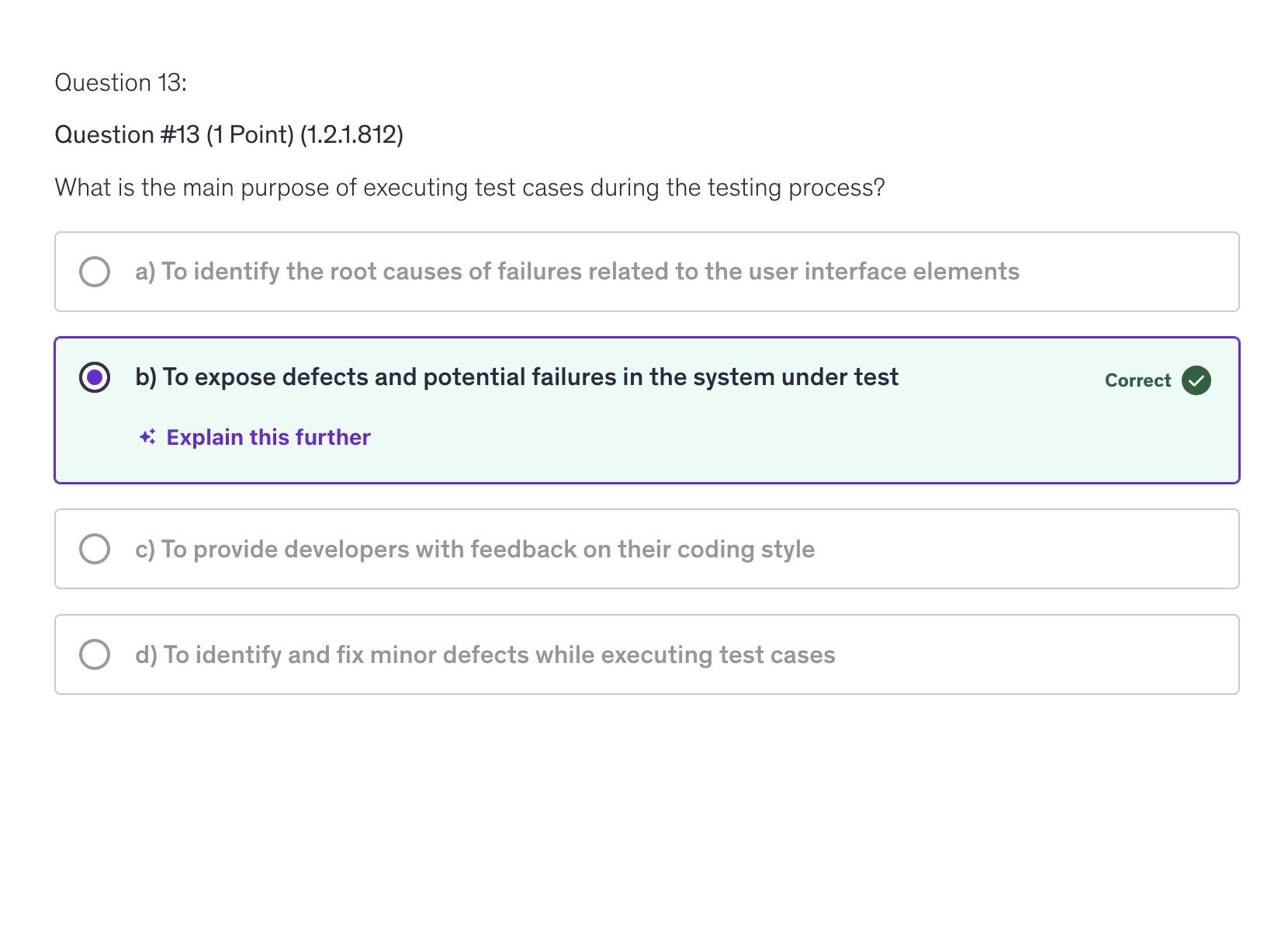
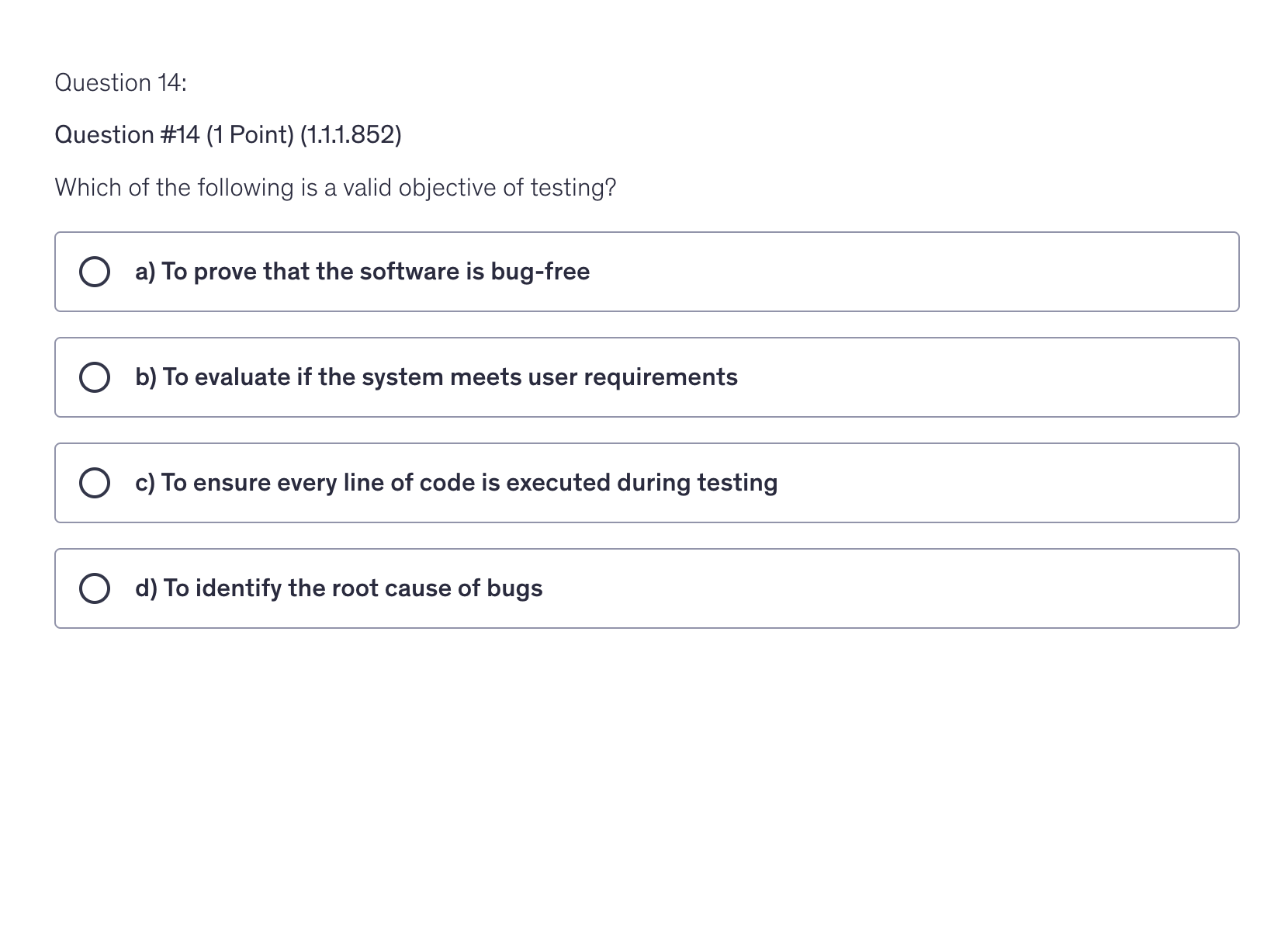
Which of the following is a valid objective of testing?
b) To evaluate if the system meets user requirements
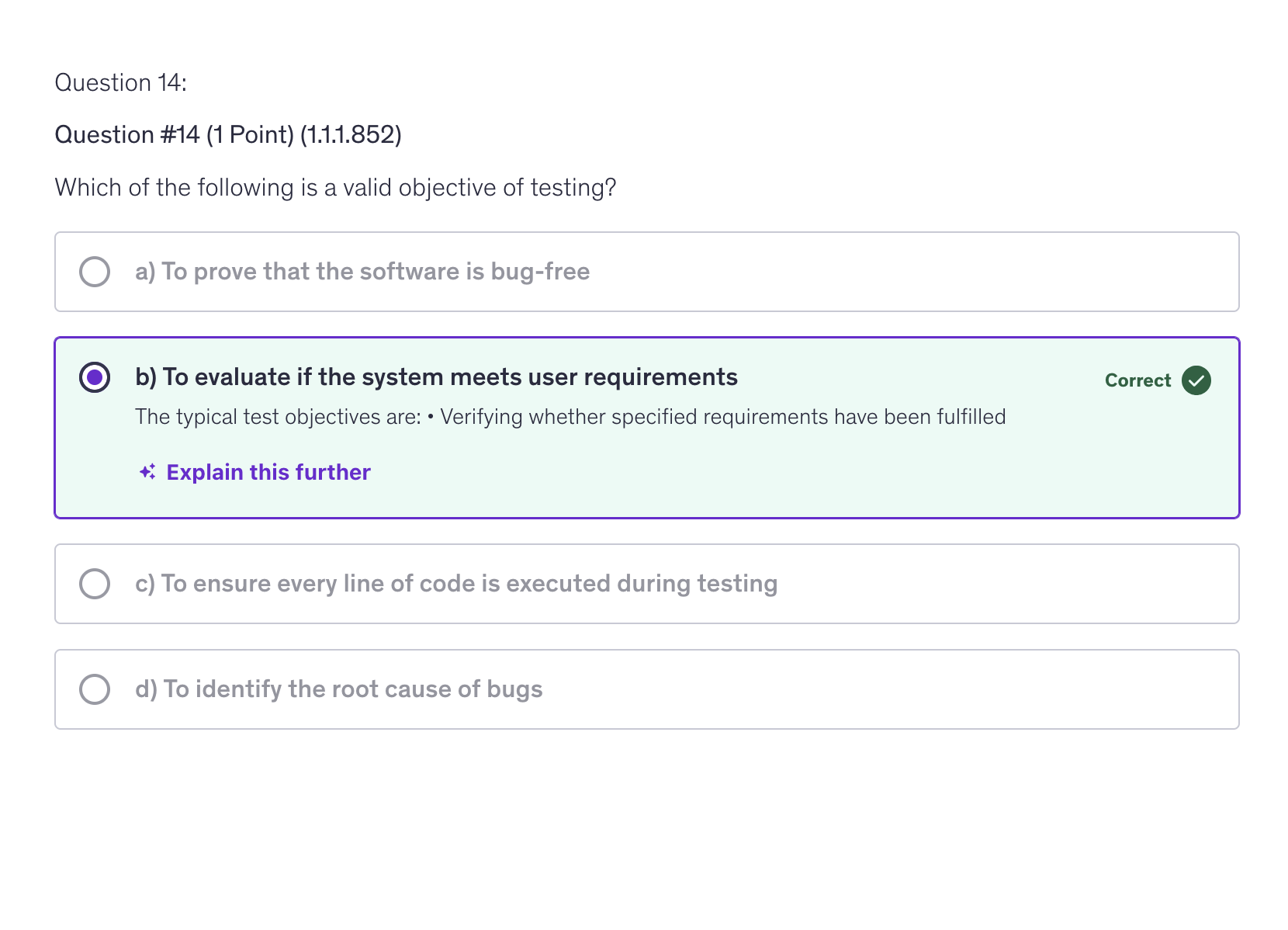
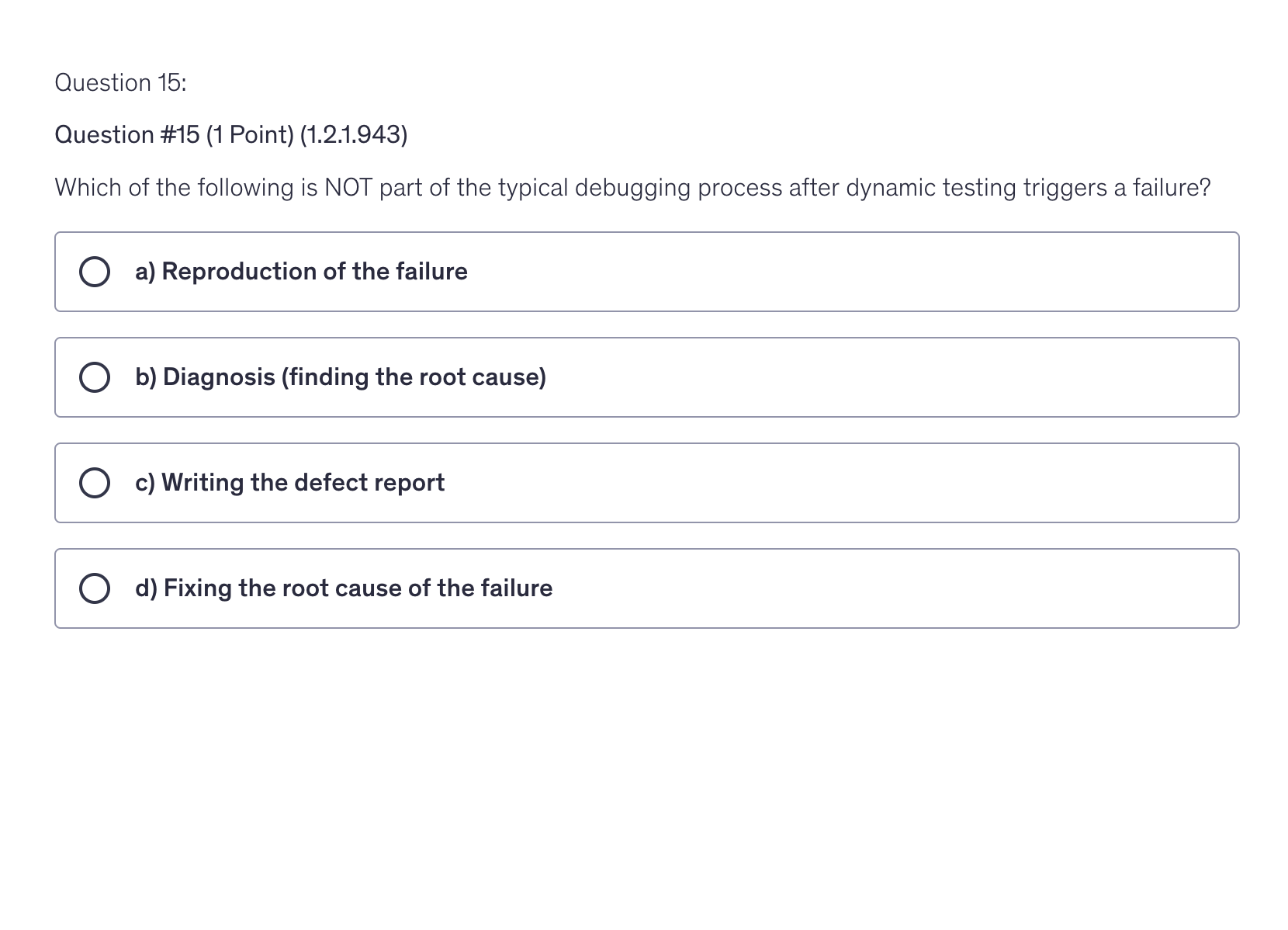
Which of the following is NOT part of the typical debugging process after dynamic testing triggers a failure?
c) Writing the defect report
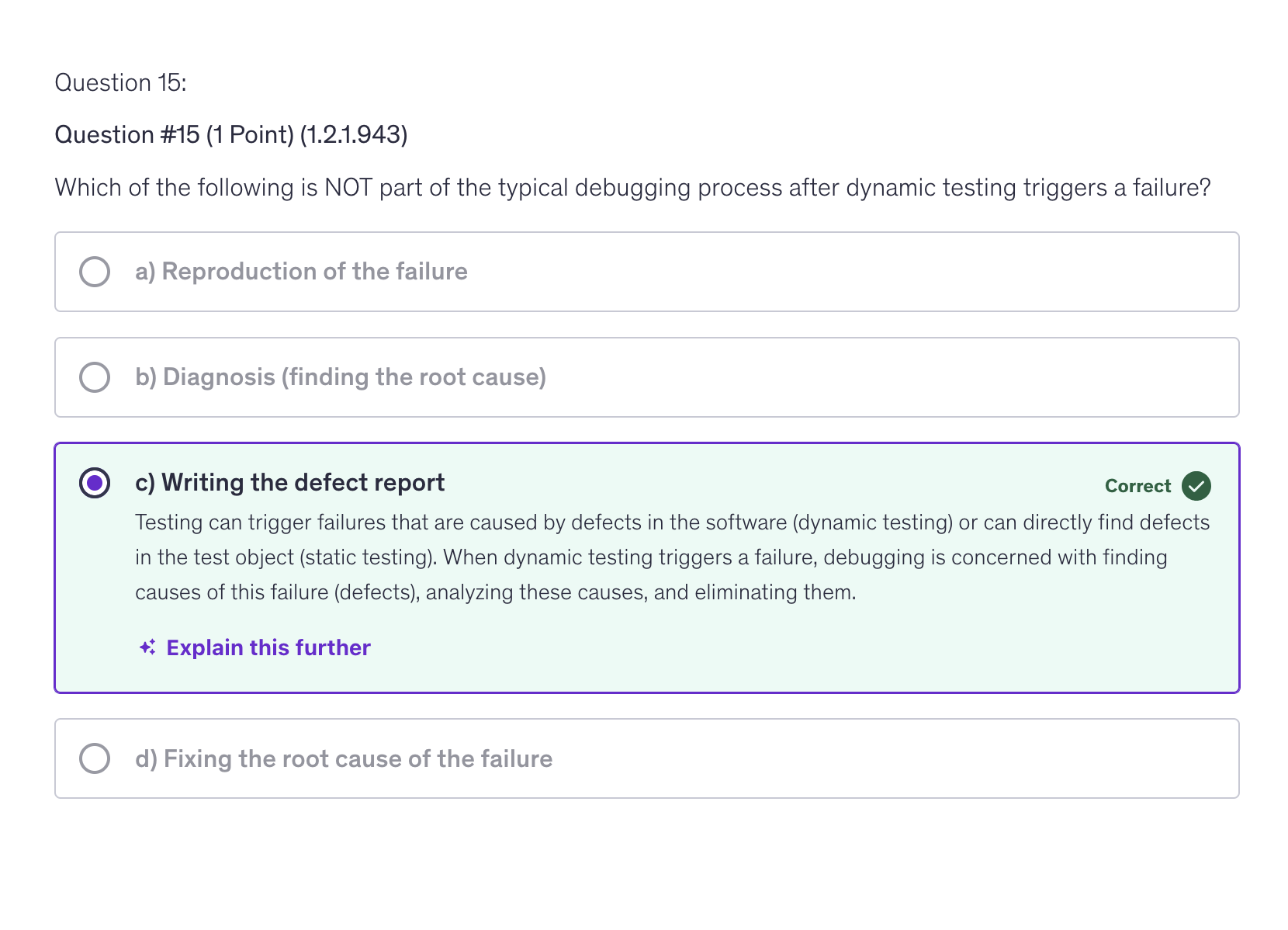
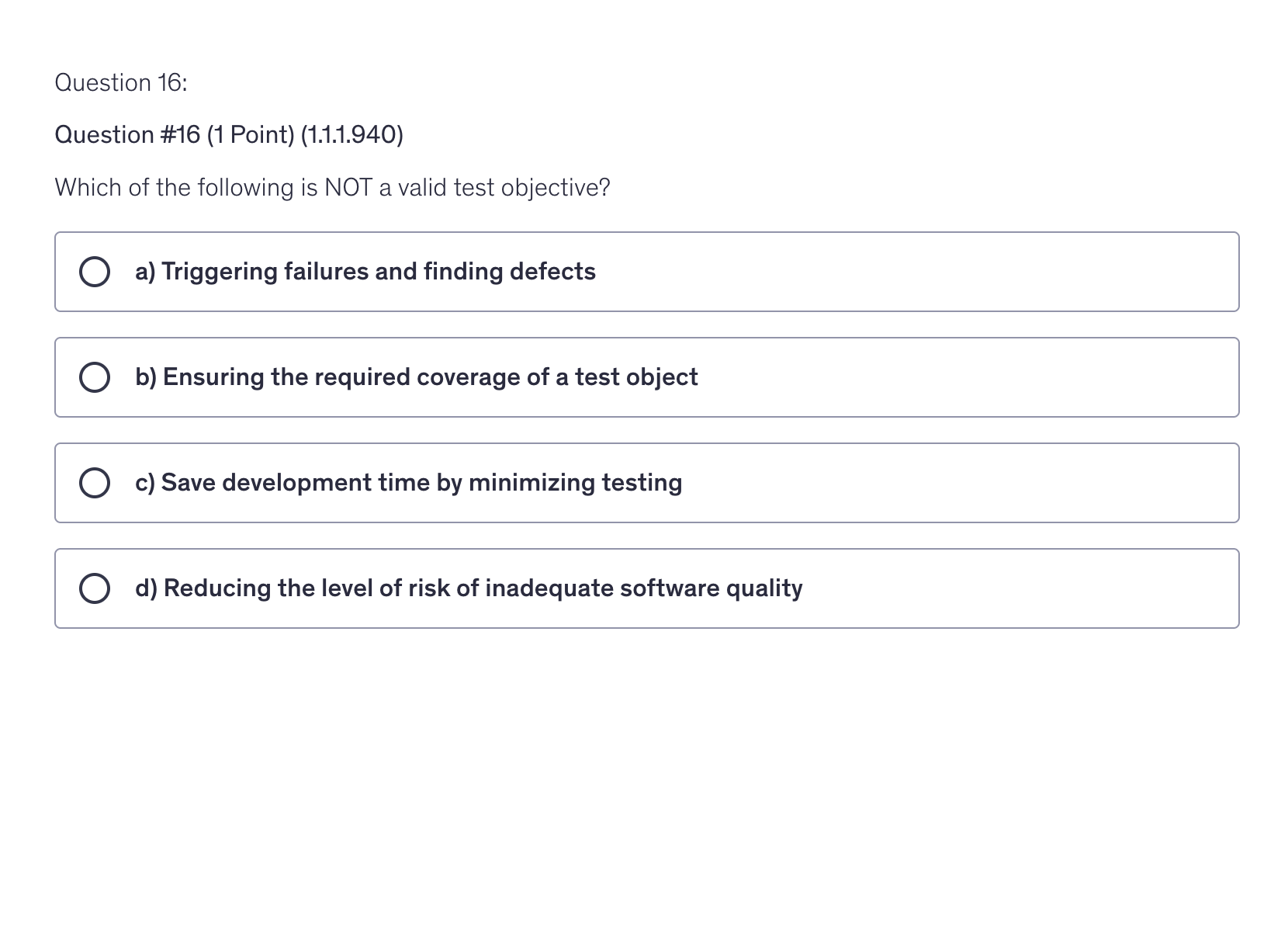
Which of the following is NOT a valid test objective?
c) Save development time by minimizing testing
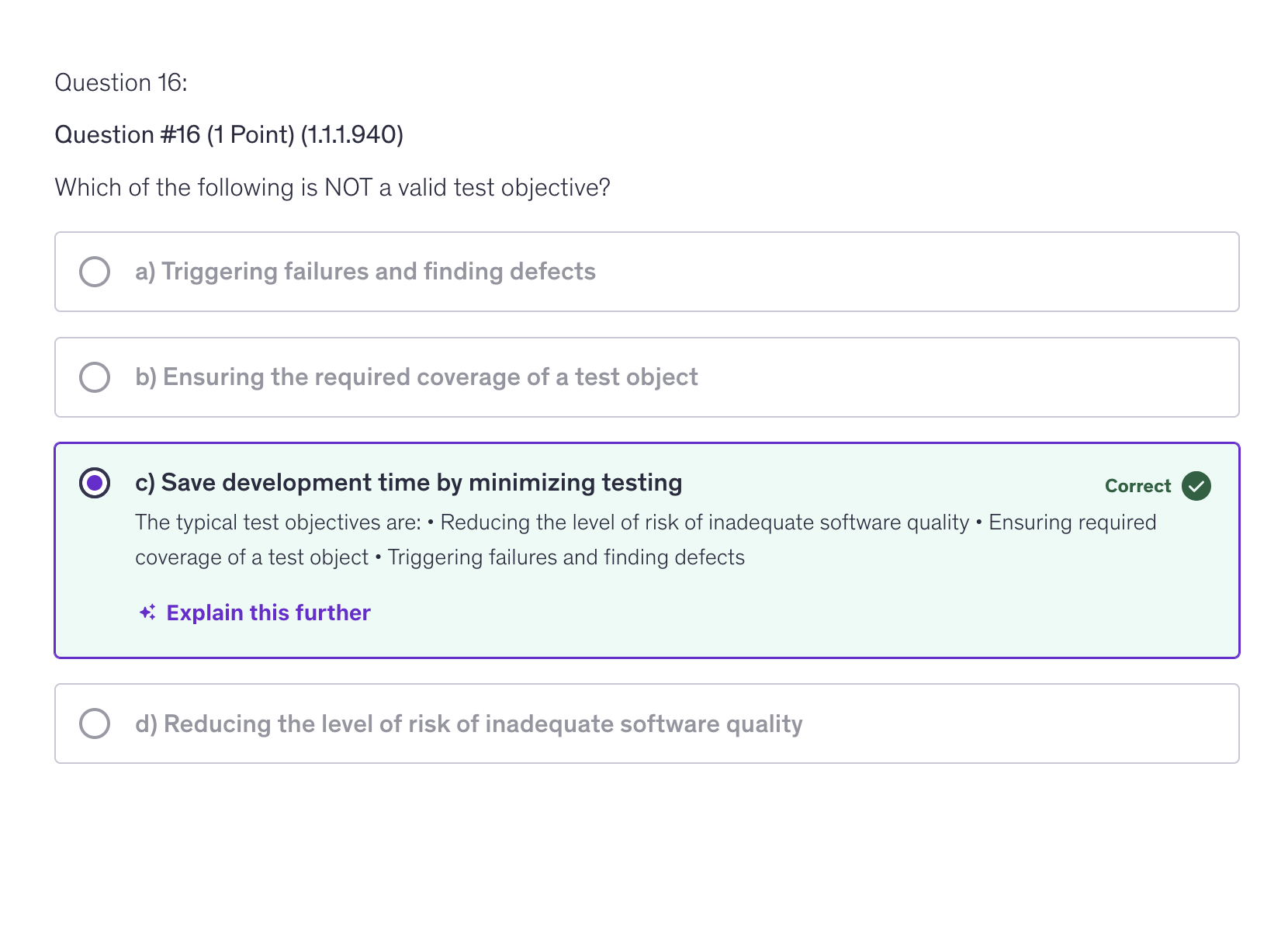
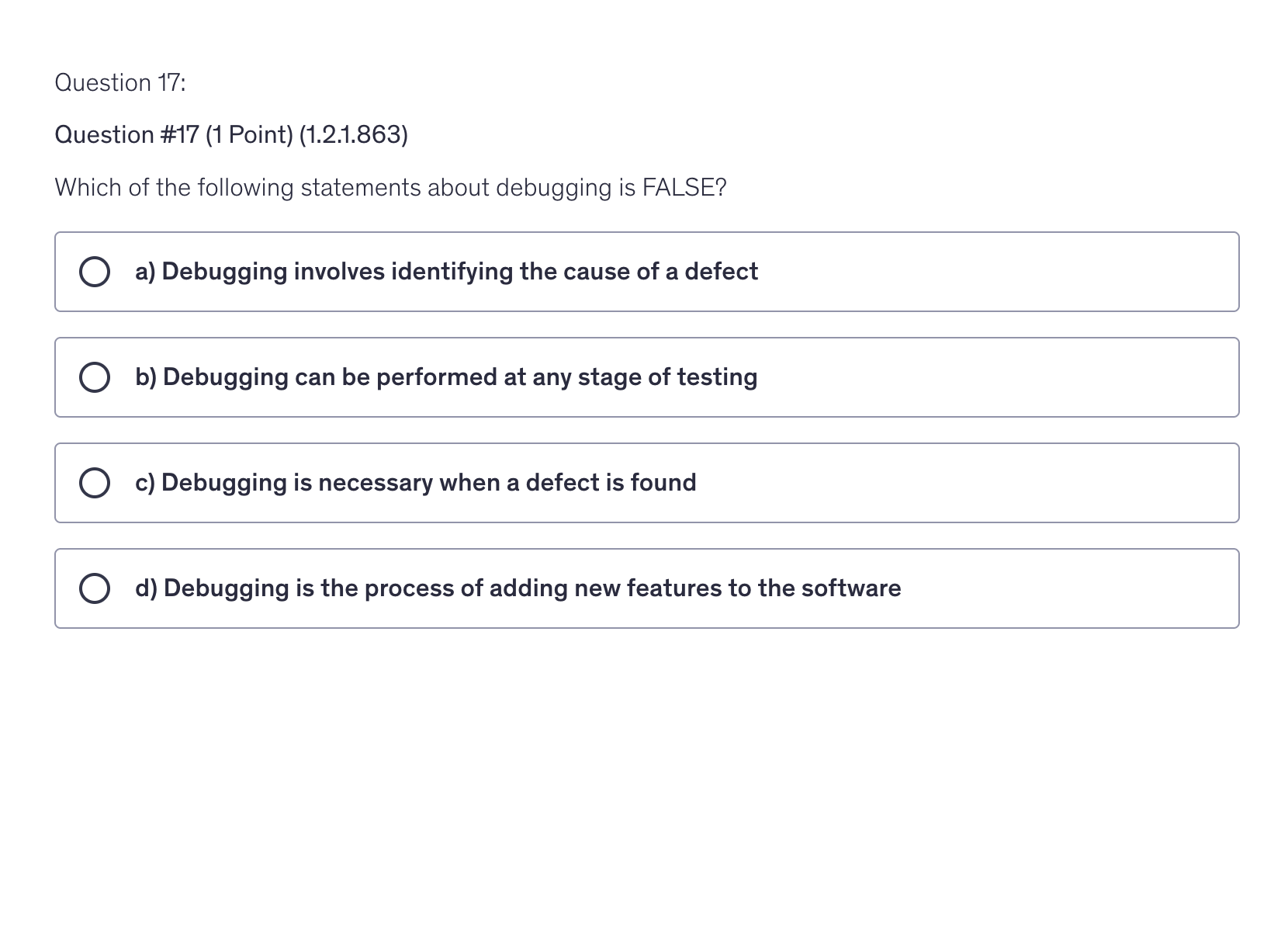
Which of the following statements about debugging is FALSE?
d) Debugging is the process of adding new features to the software
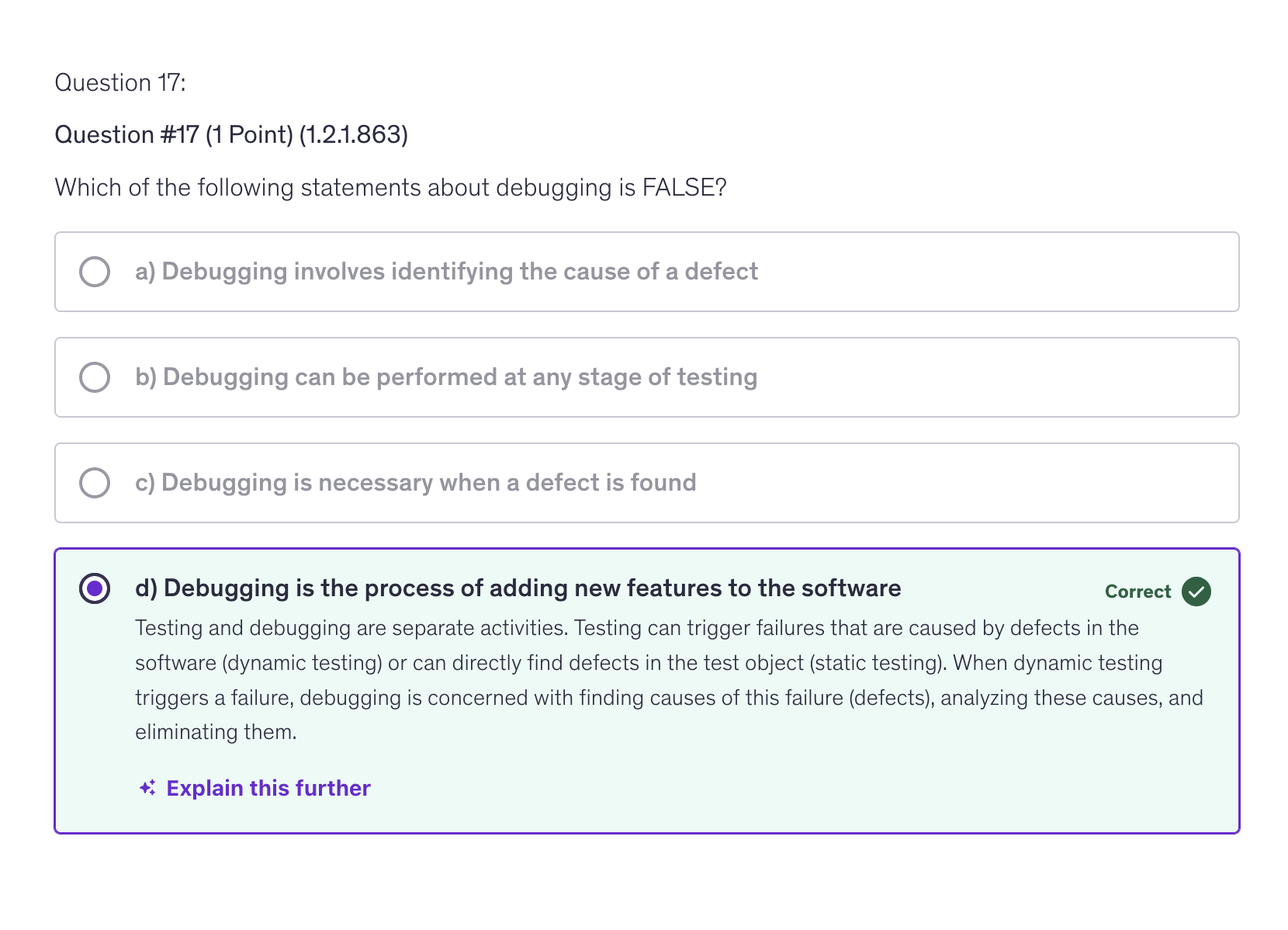
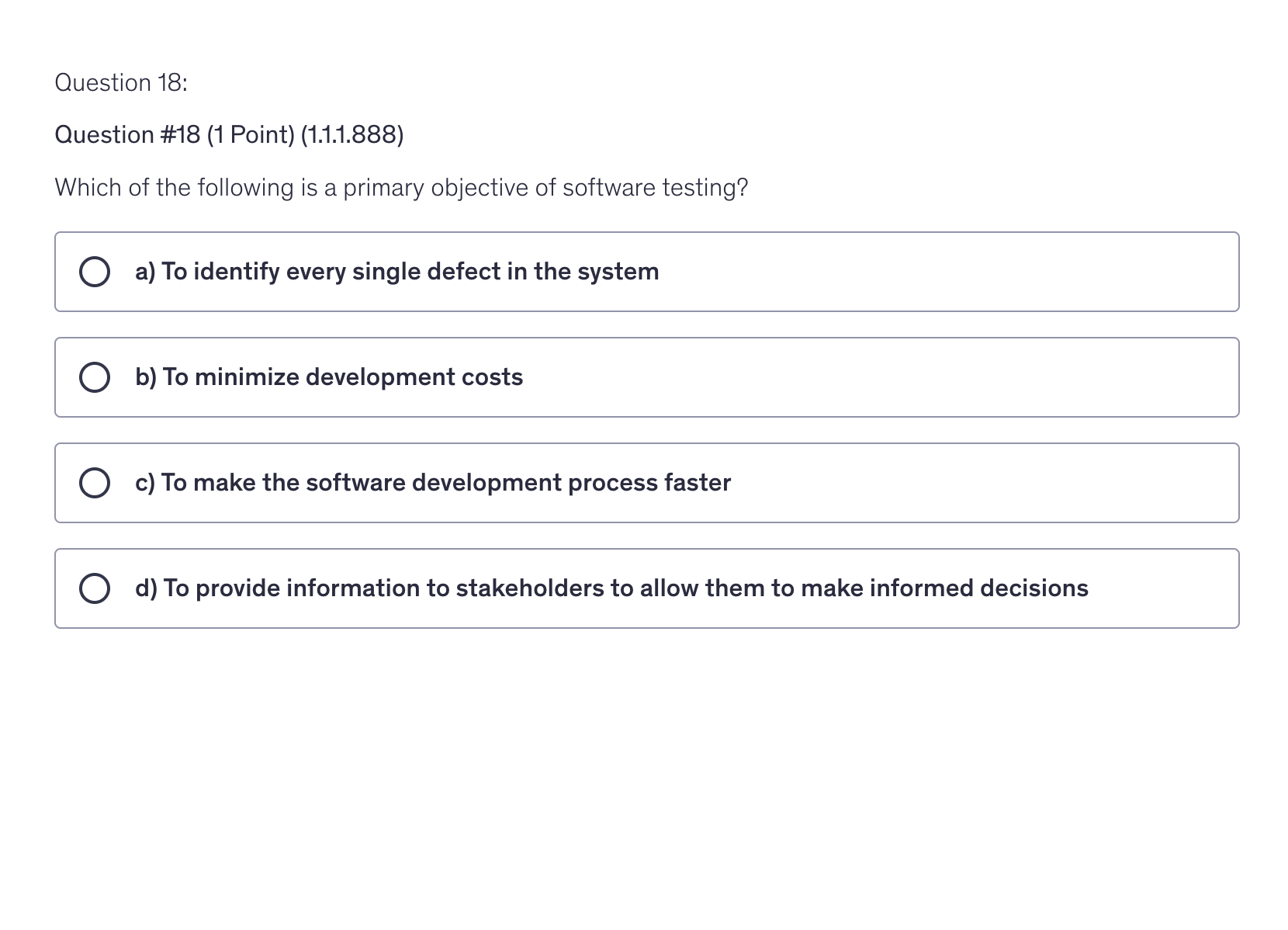
Which of the following is a primary objective of software testing?
d) To provide information to stakeholders to allow them to make informed decisions
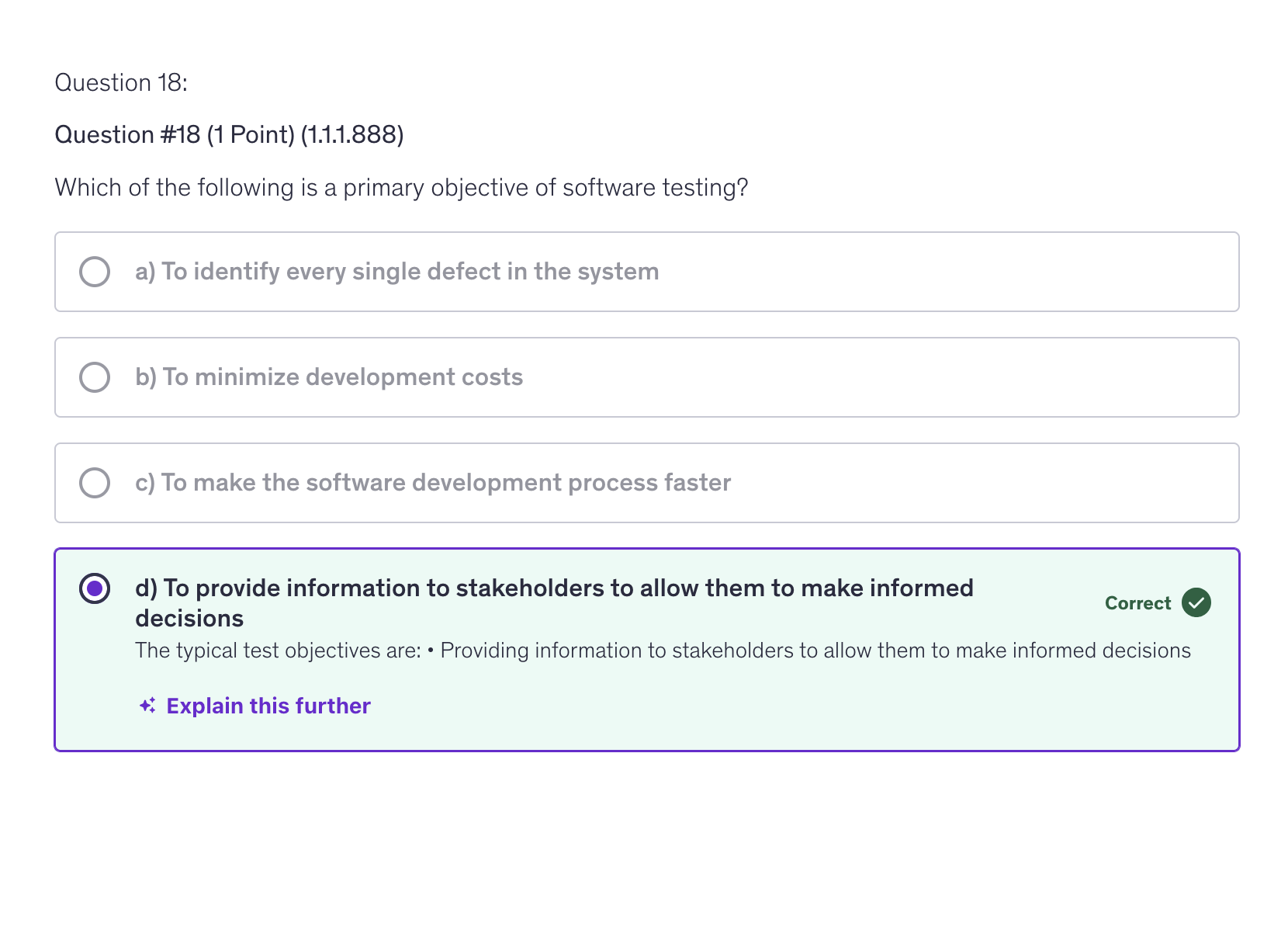
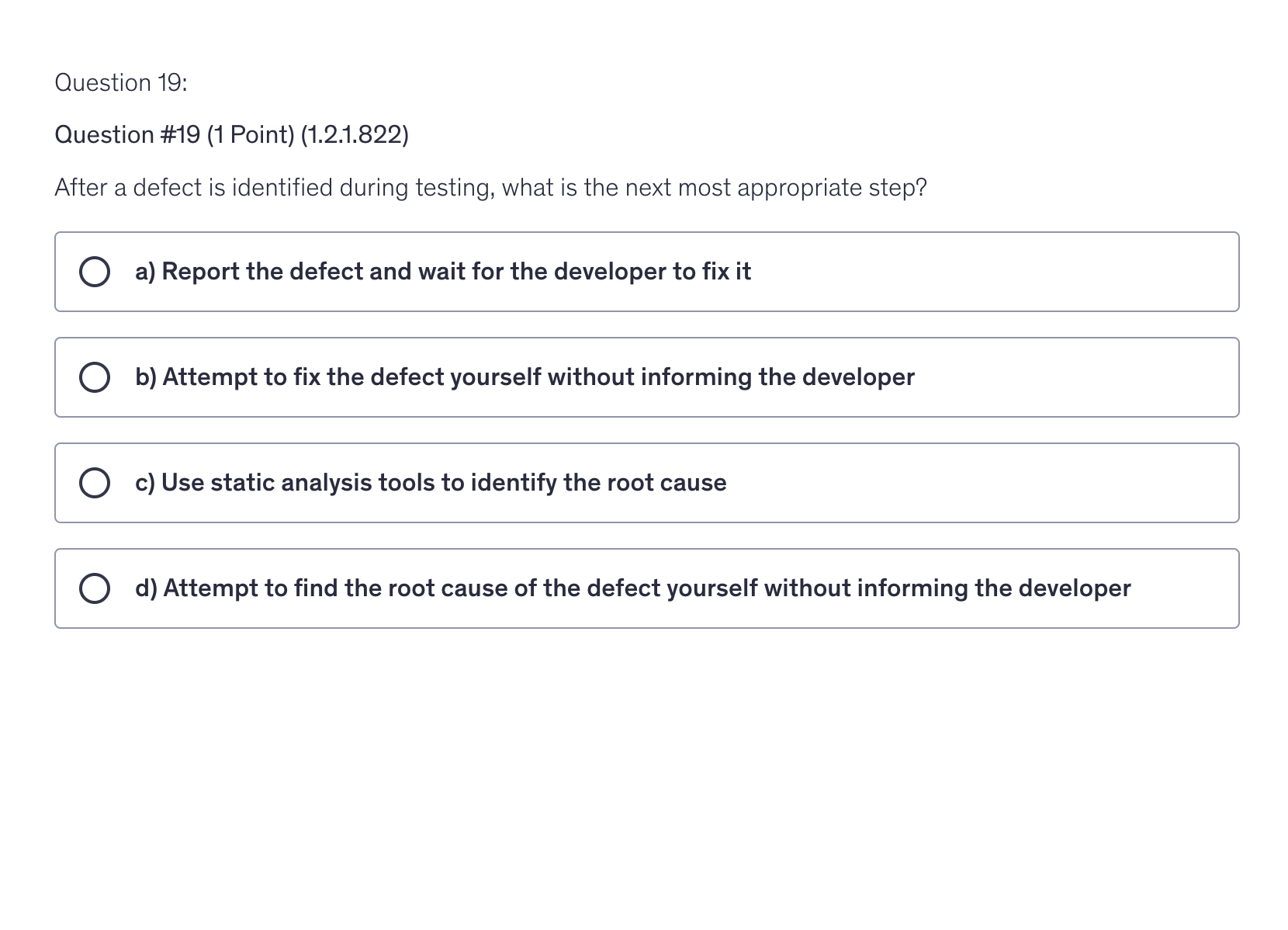
After a defect is identified during testing, what is the next appropriate step?
a) Report the defect and wait for the developer to fix it
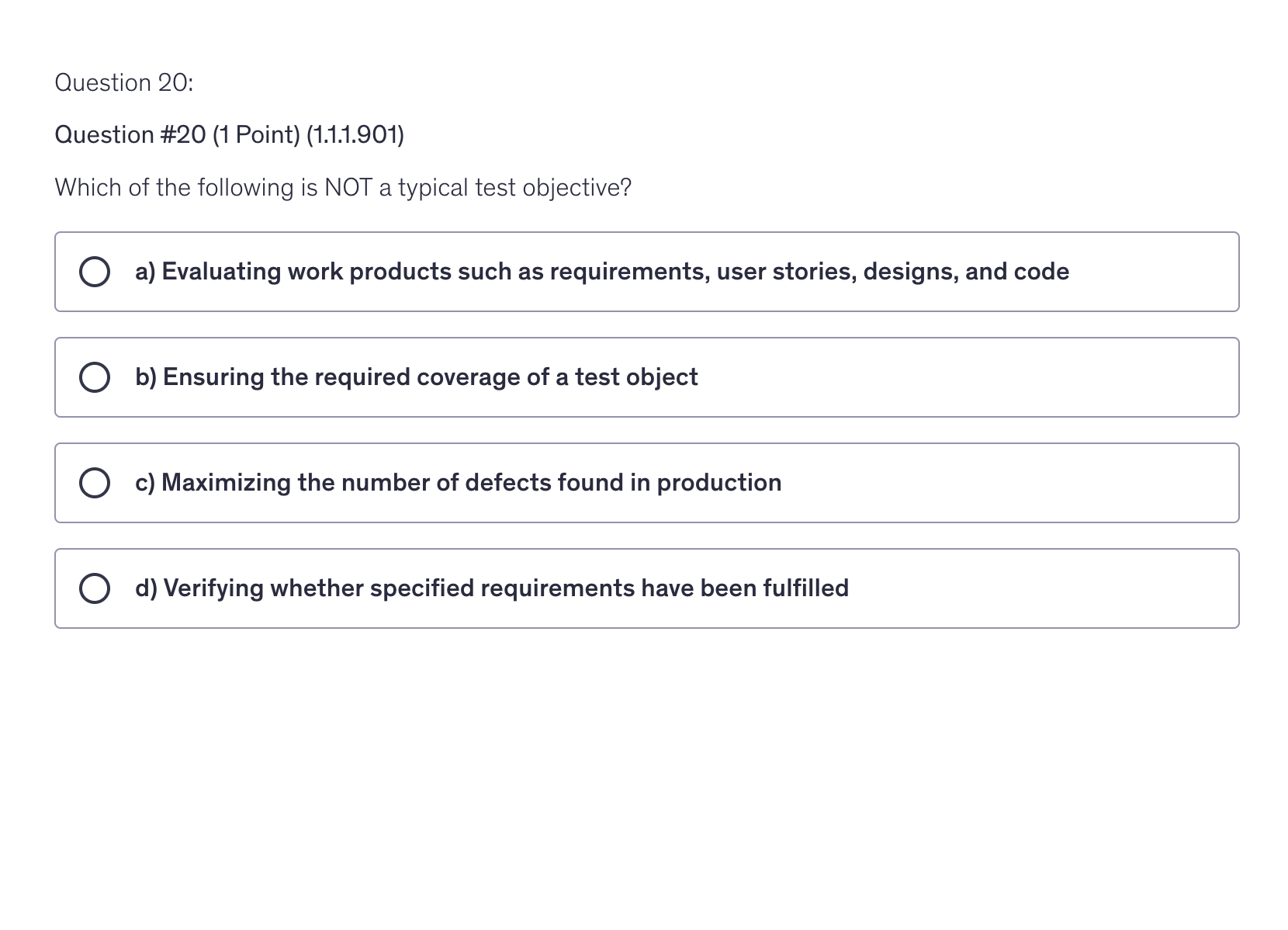
Which of the following is NOT a typical test objective?
c) Maximizing the number of defects found in production
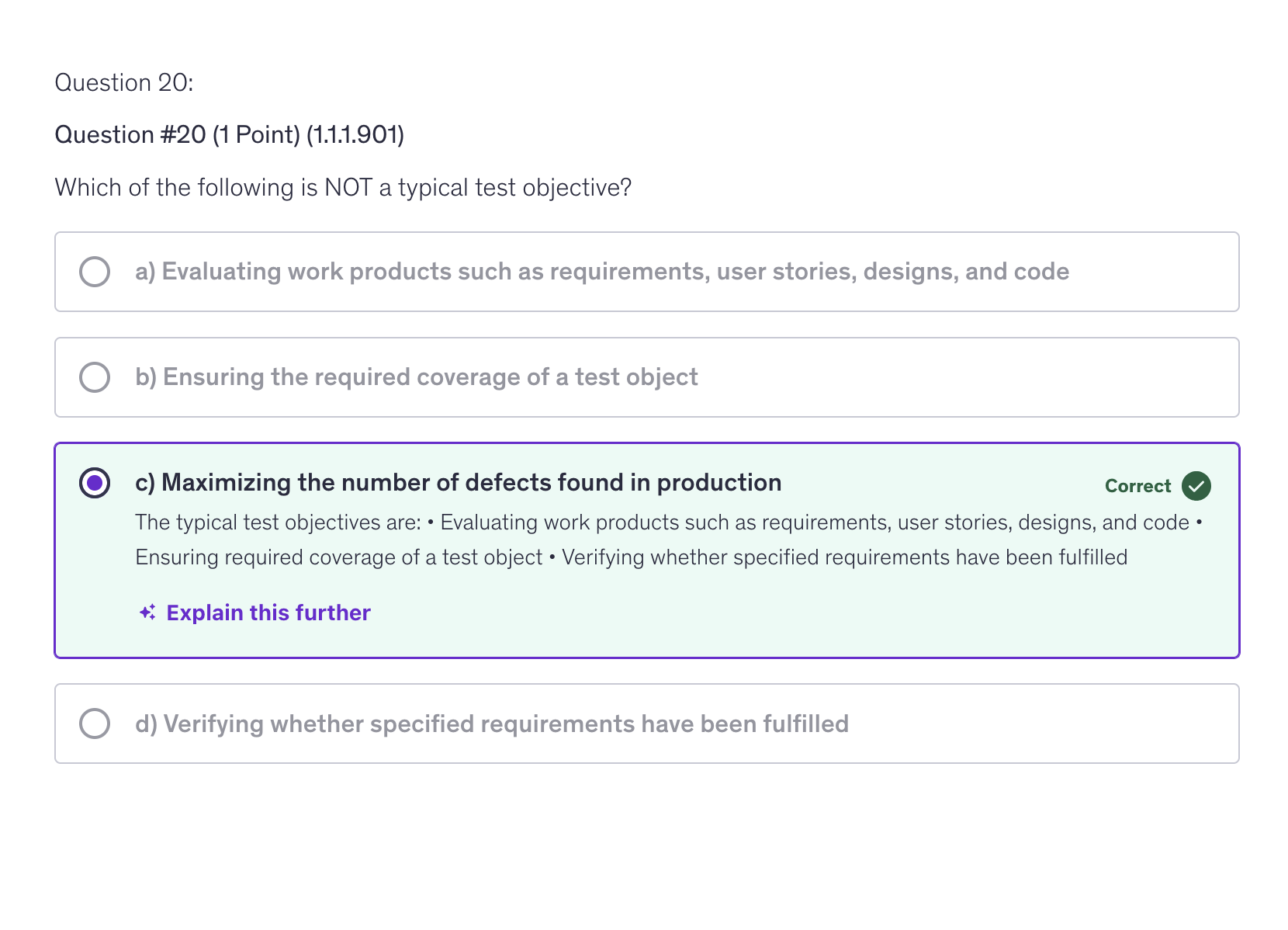
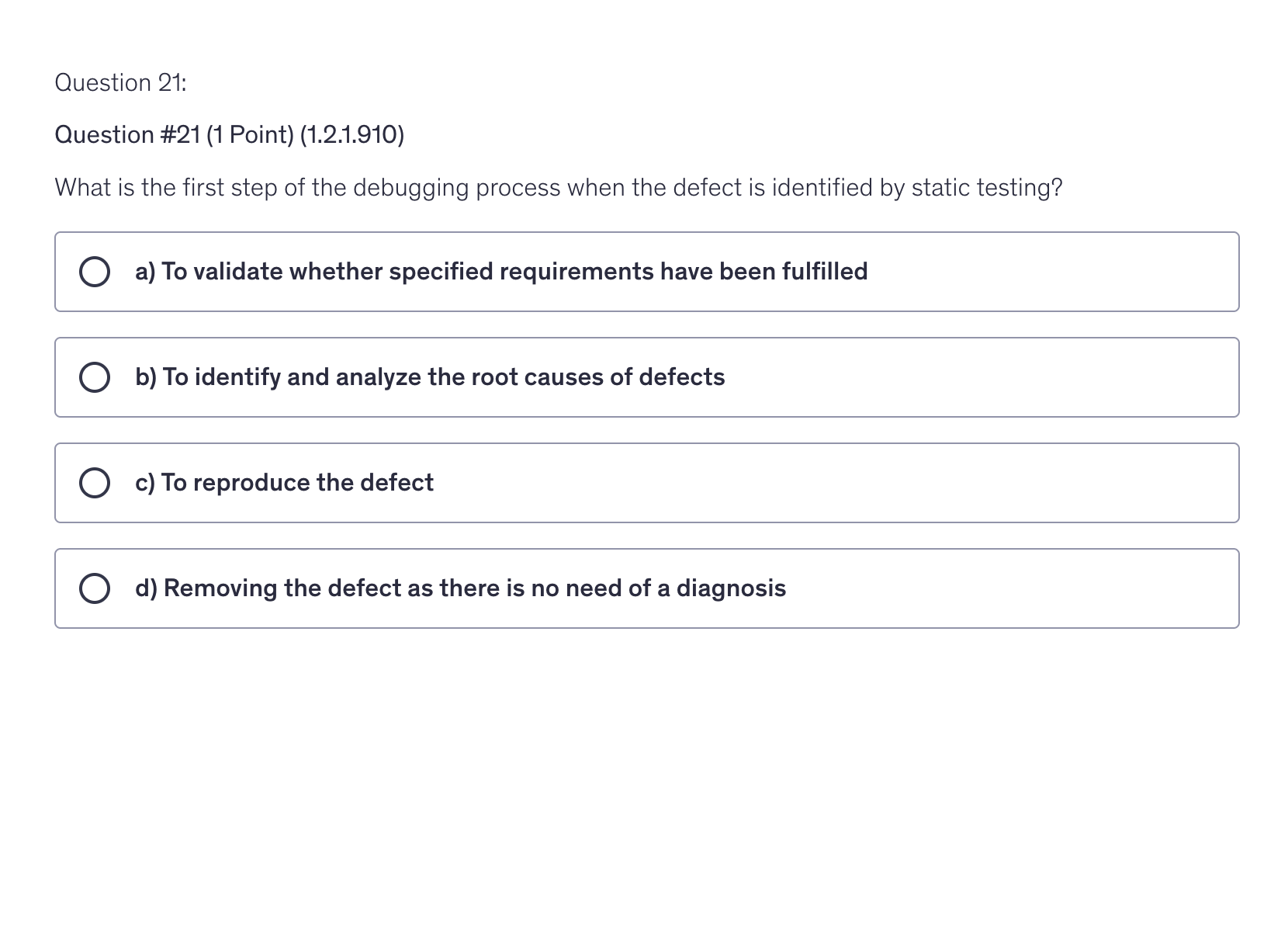
What is the first step of the debugging process when the defect is identified by static testing?
d) Removing the defect as there is no need of a diagnosis%
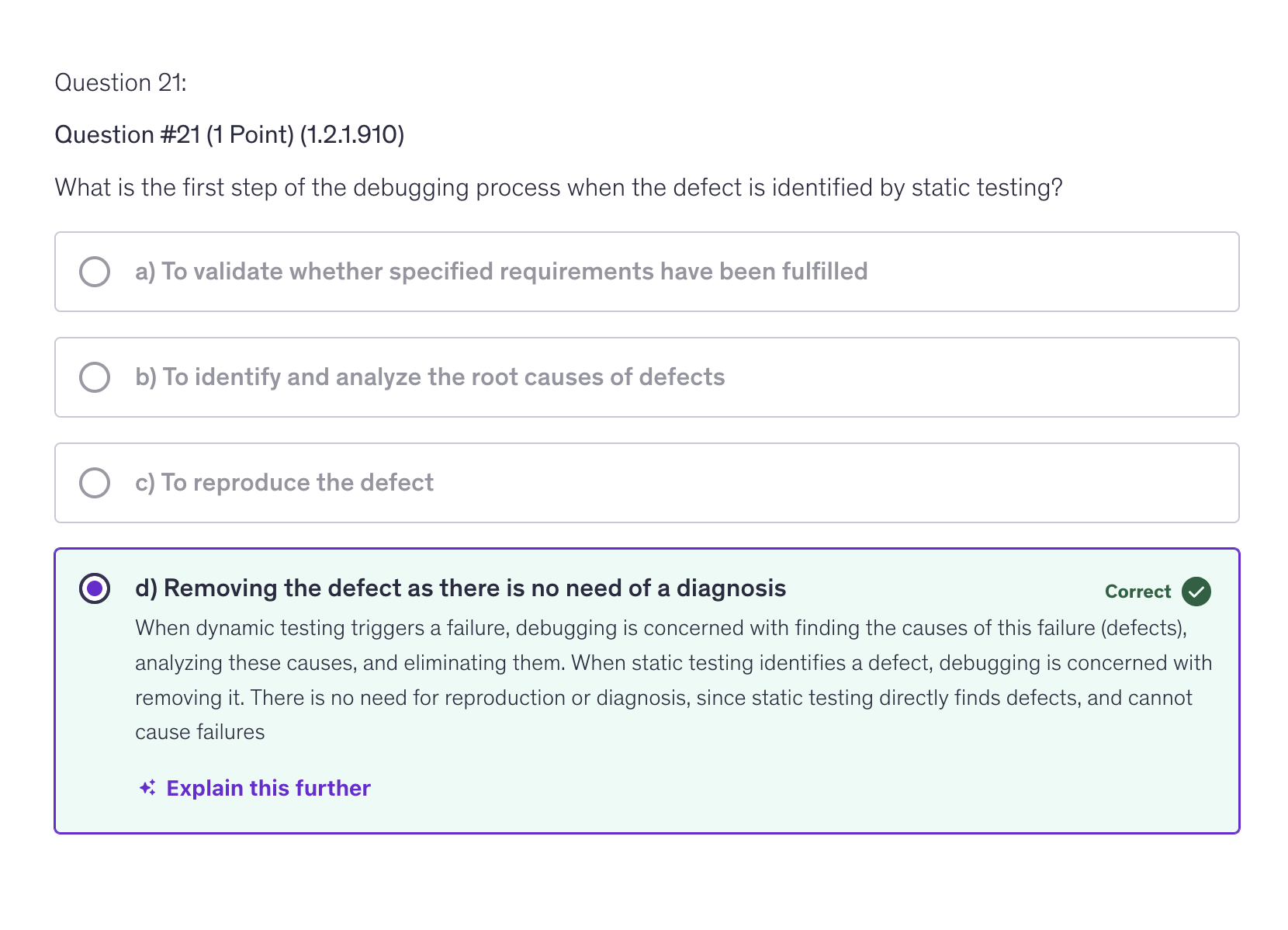
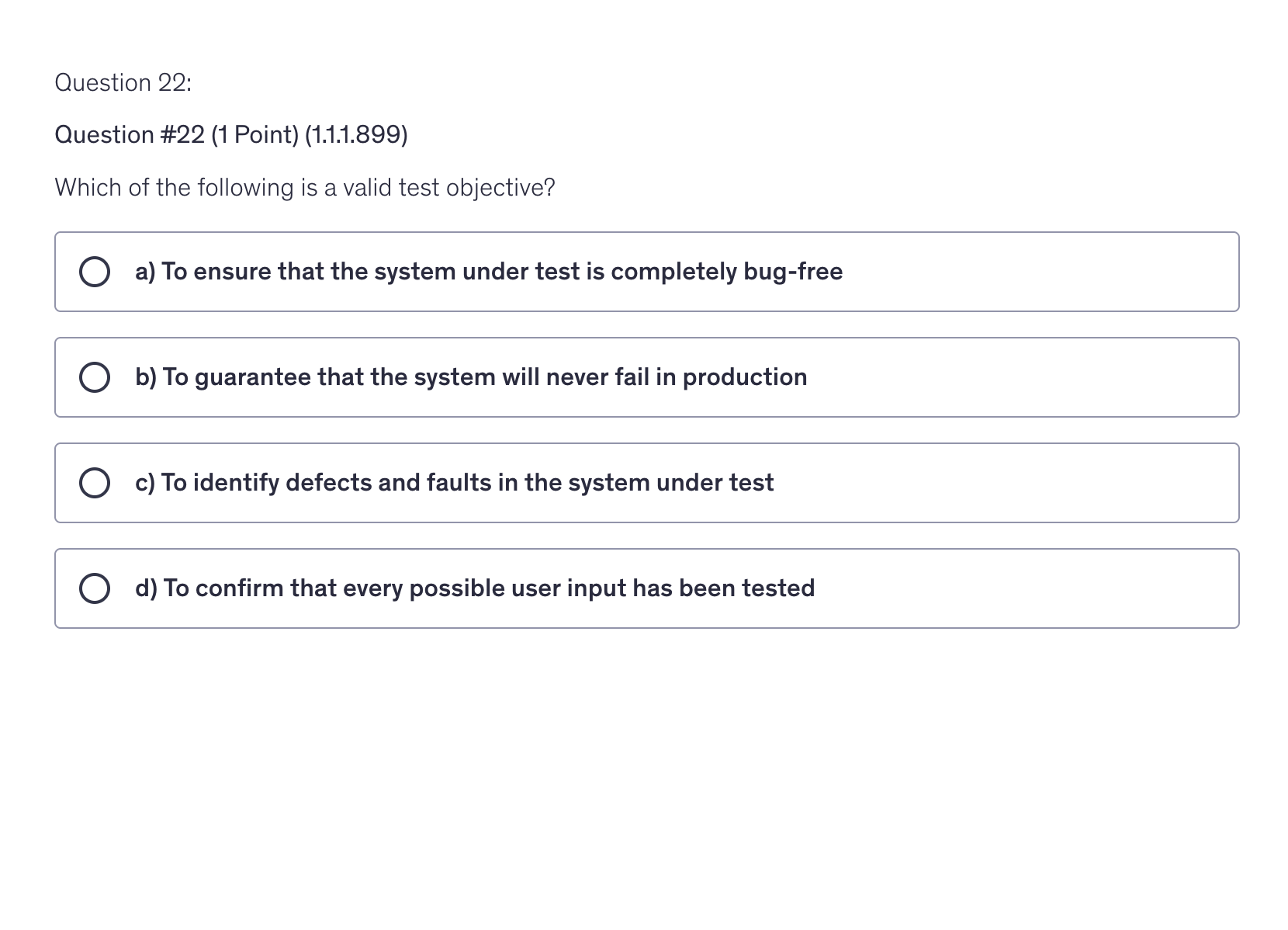
Which of the following is a valid test objective?
c) To identify defects and faults in the system
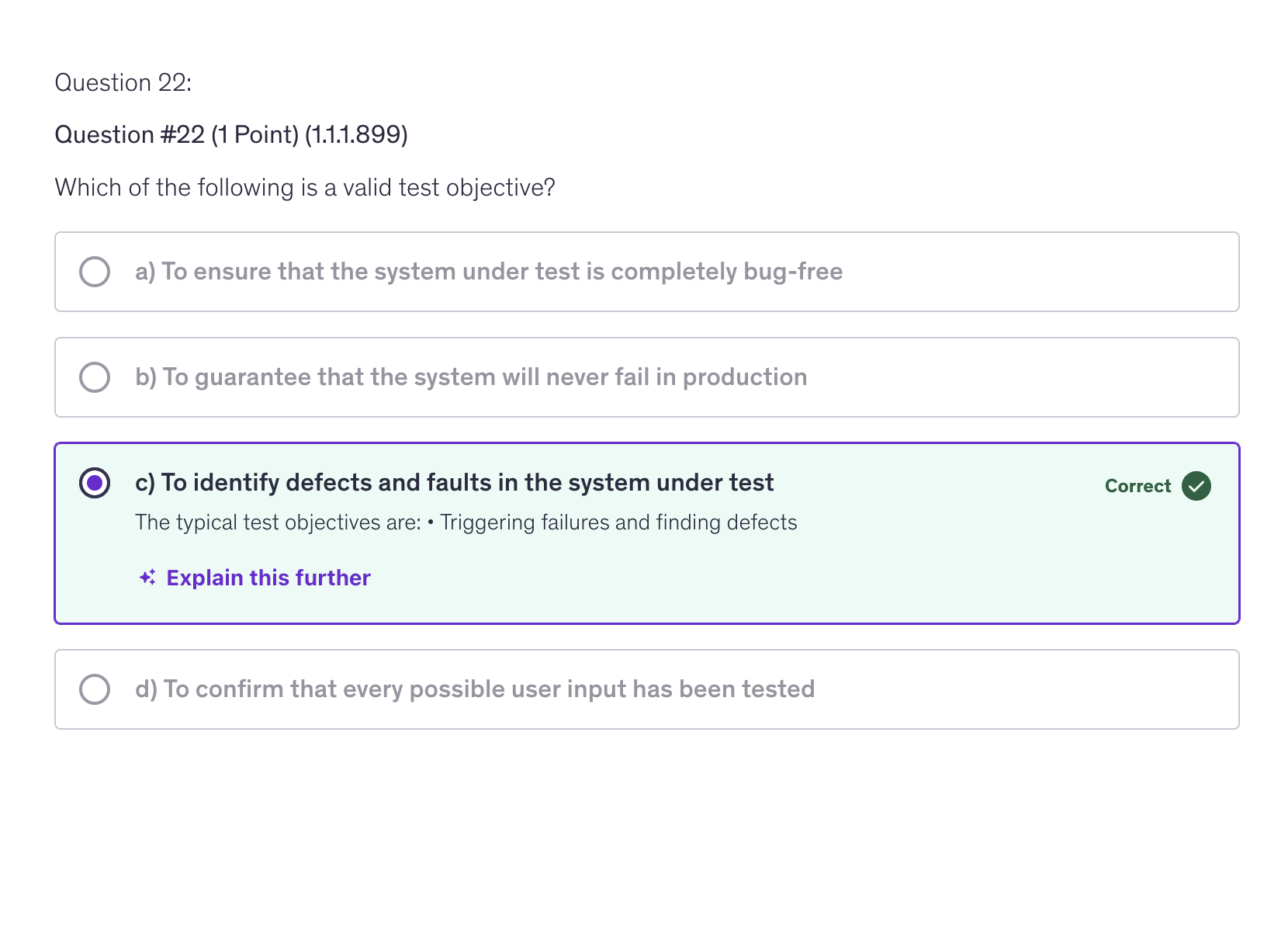
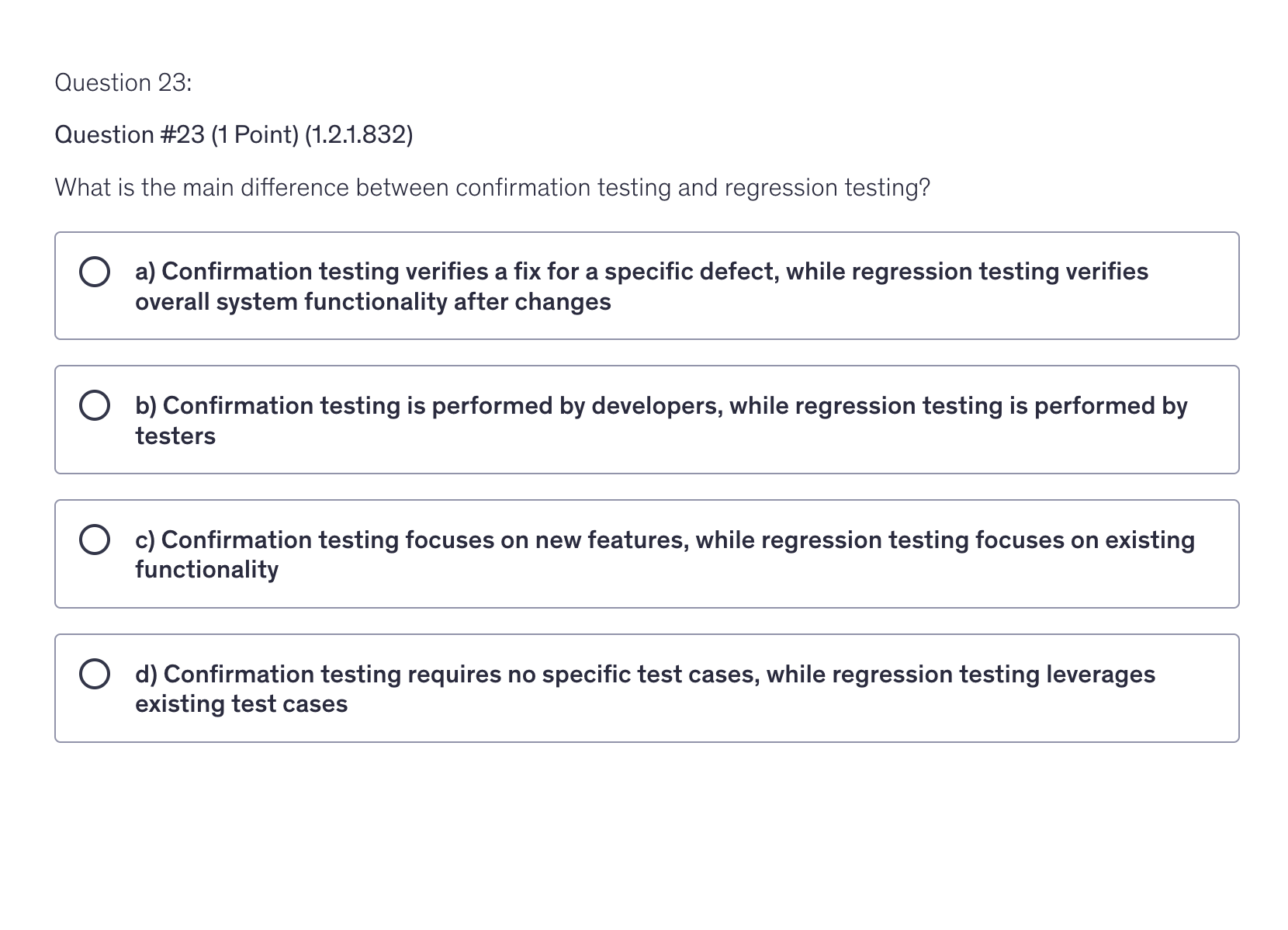
What is the main difference between confirmation testing and regression testing?
a) Confirmation testing verifies a fix for a specific defect, while regression testing verifies overall system functionality after changes
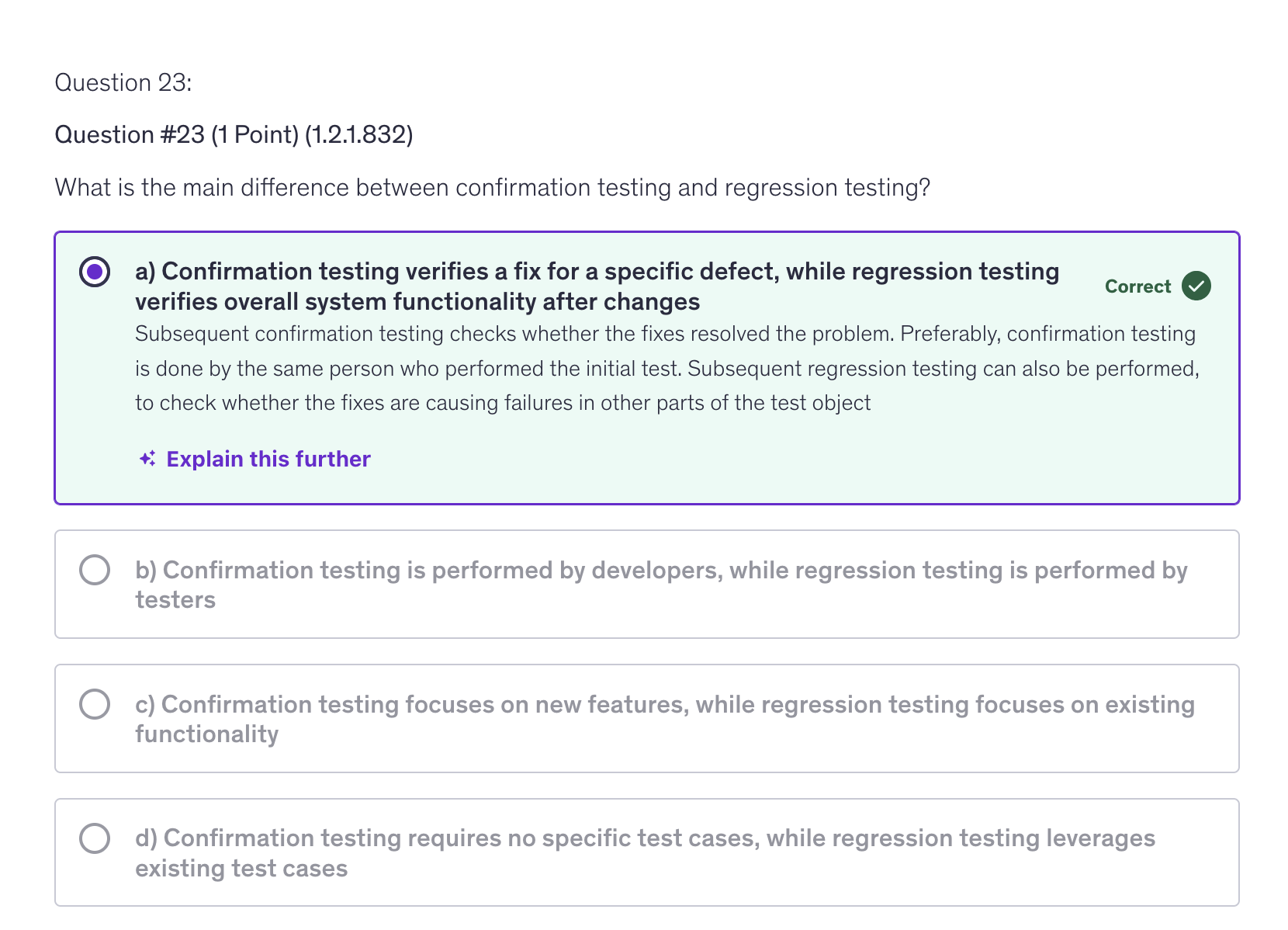
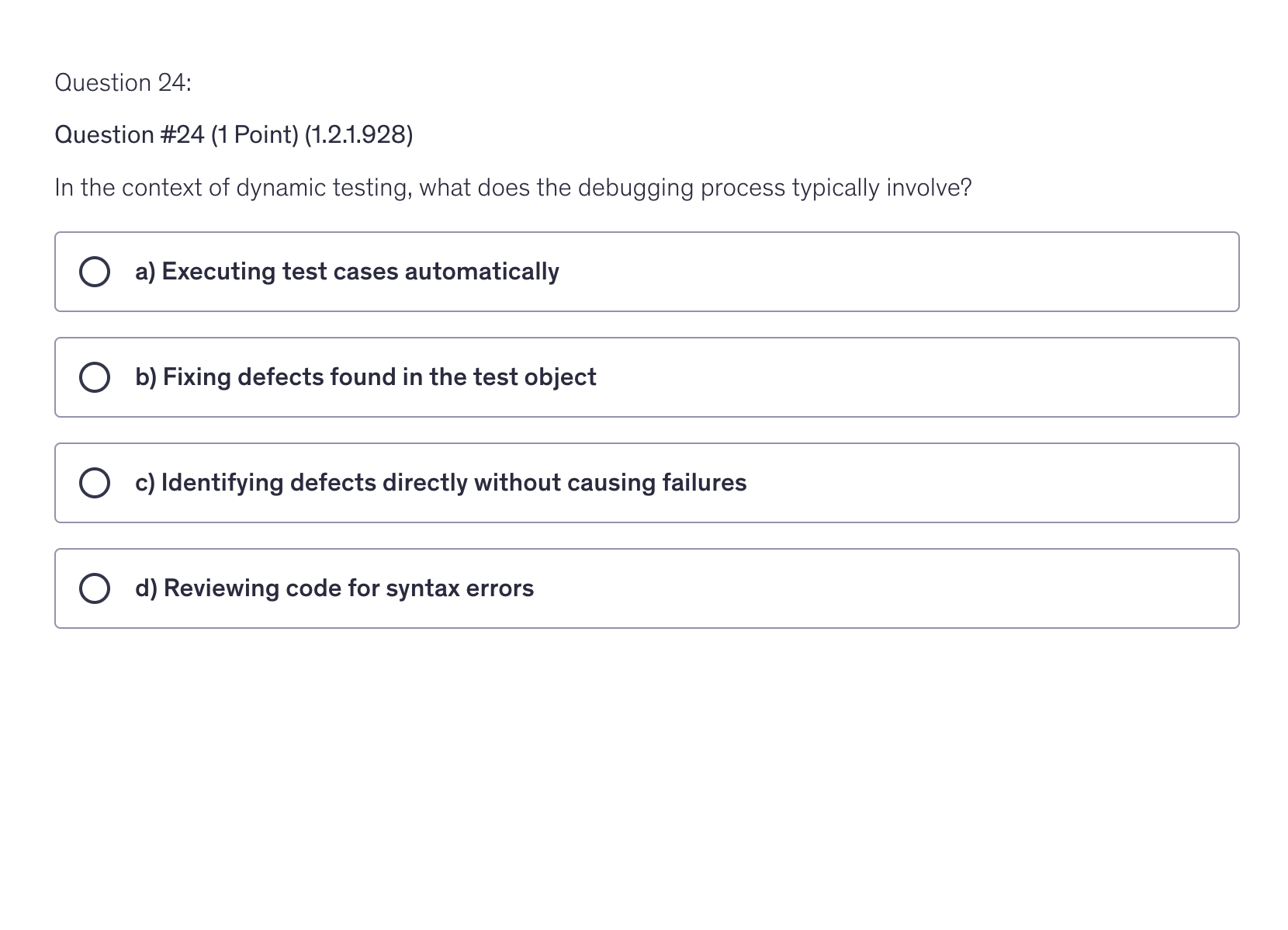
In the context of dynamic testing, what does the debugging process typically involve?
b) Fixing defects found in the test object
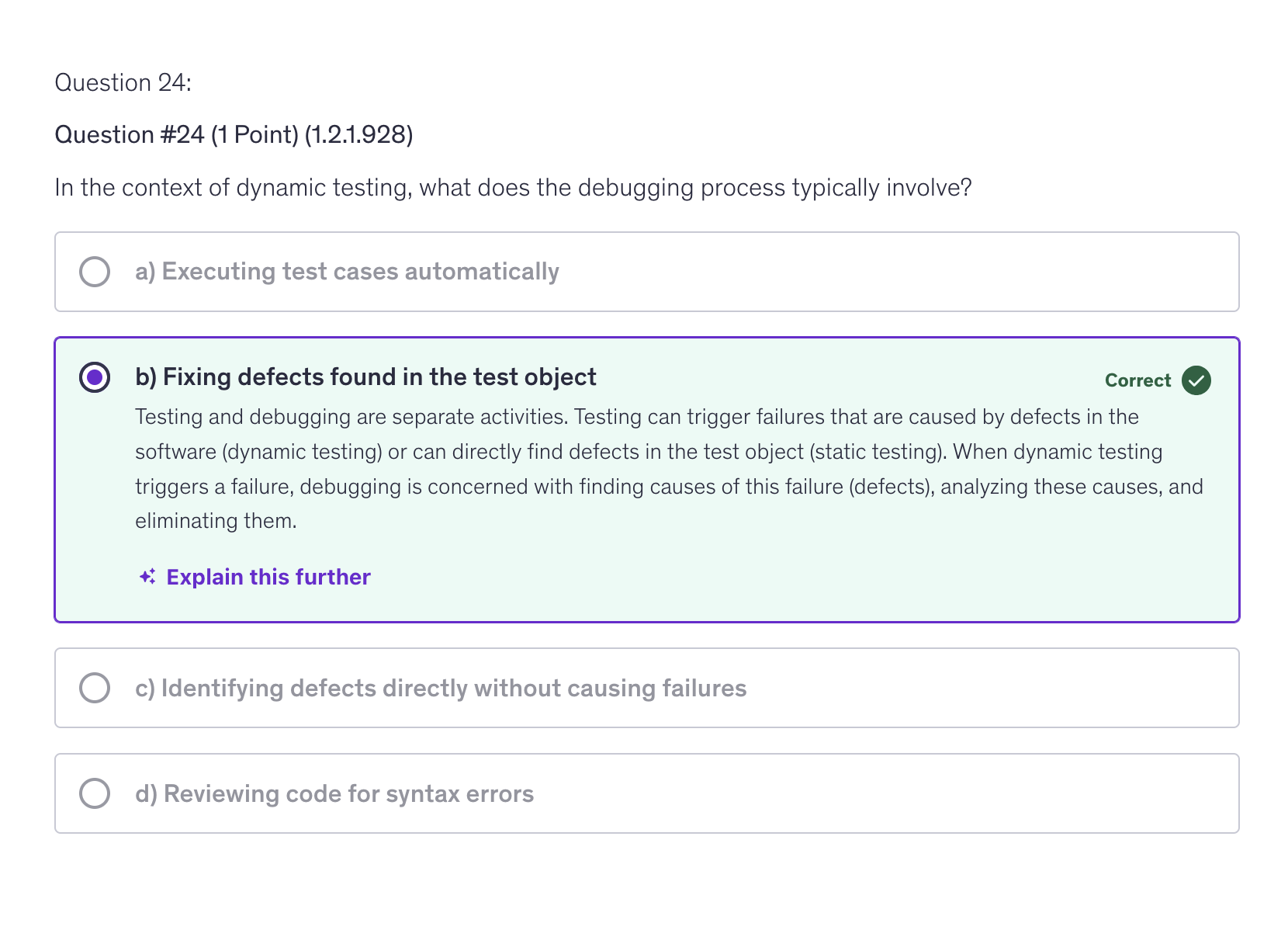
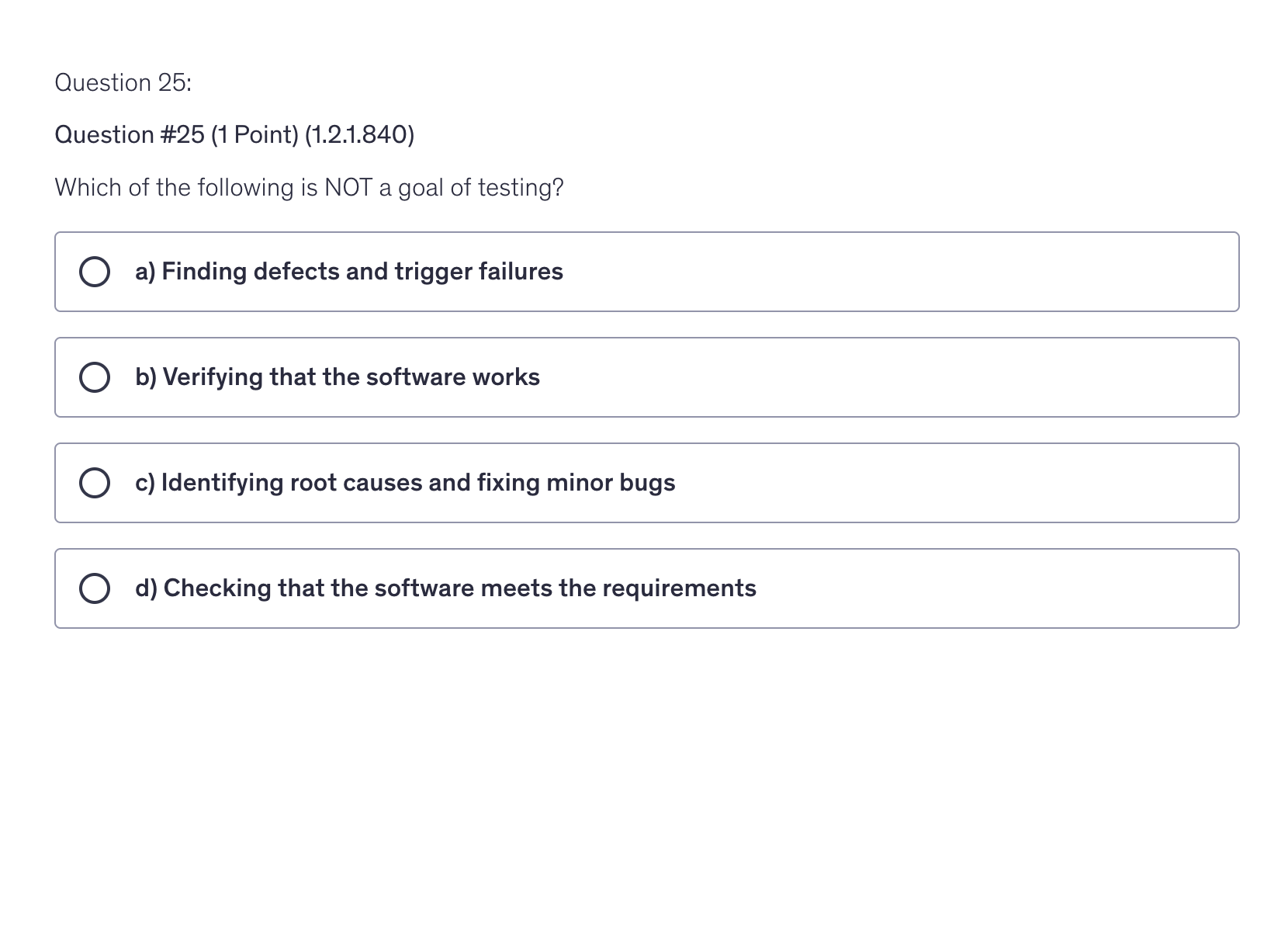
Which of the following is NOT a goal of testing?
c) Identifying root causes and fixing minor bugs
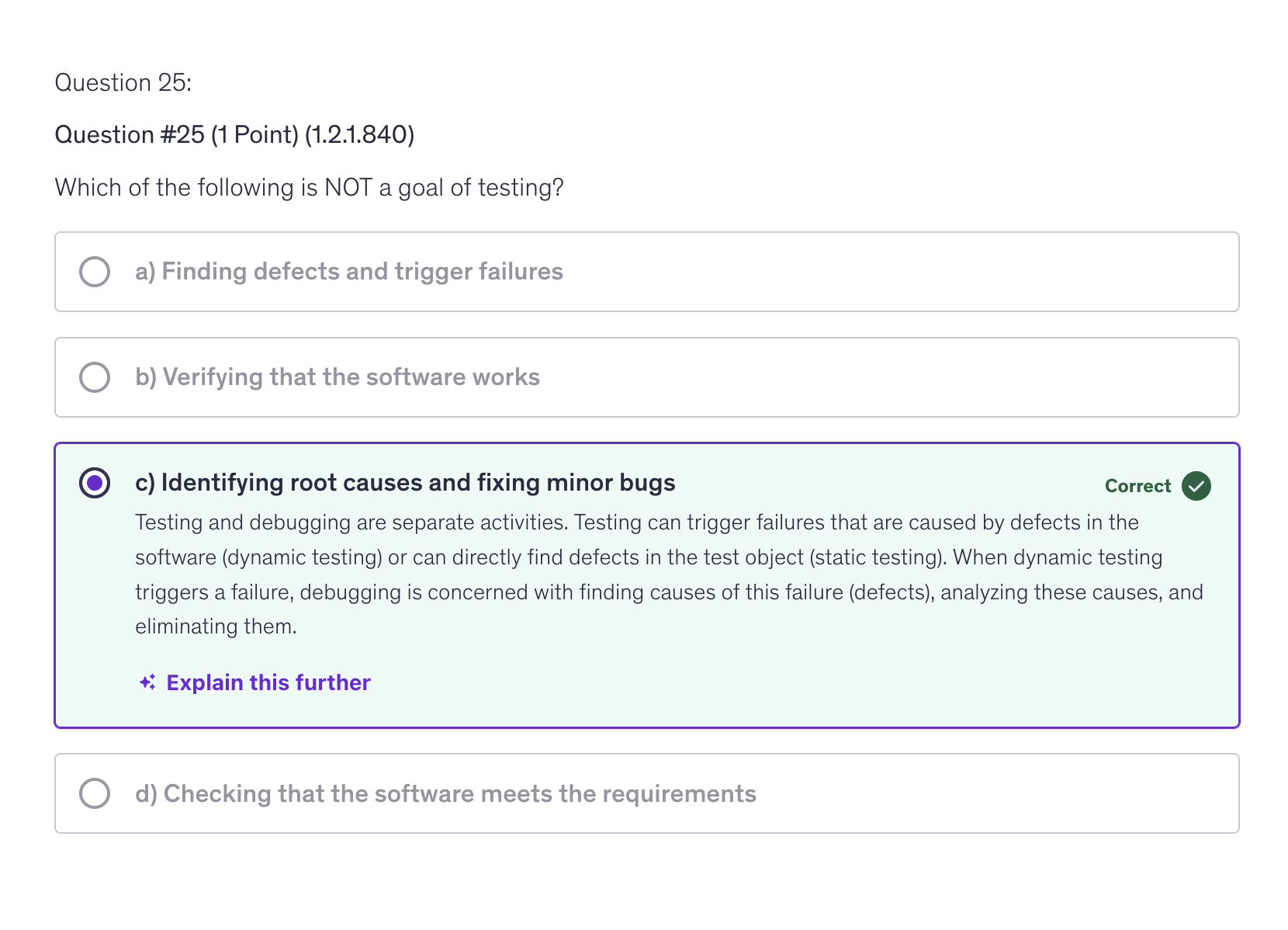
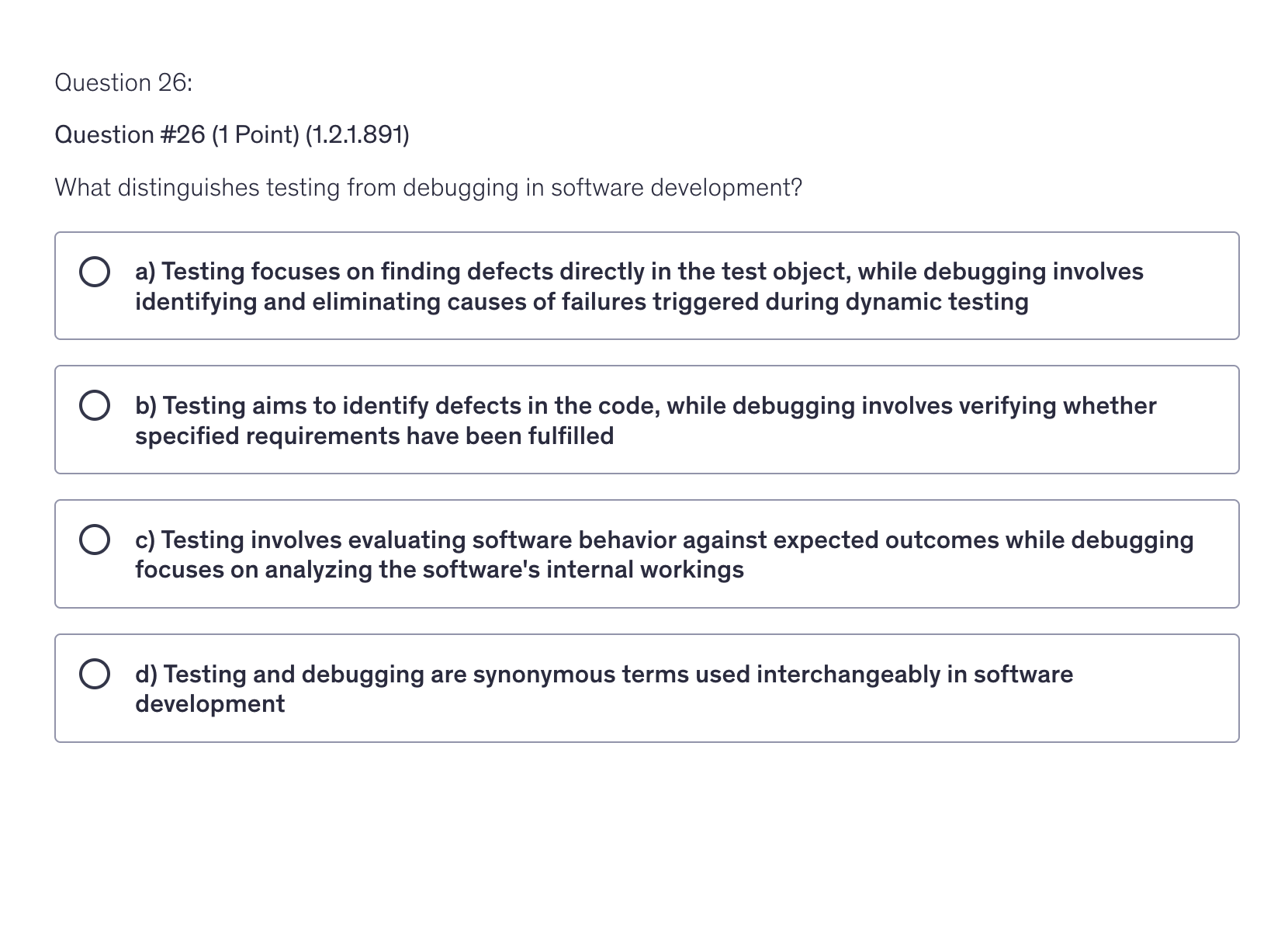
What distinguishes testing from debugging in software development?
a) Testing focuses on finding defects directly in the test object, while debugging involves identifying and eliminating causes of failures triggered during dynamic testing
